Online Security
- Safari vs Chrome in 2024: Performance, Speed and Features Compared
Cloudwards.net may earn a small commission from some purchases made through our site. However, any earnings do not affect how we review services. Learn more about our editorial integrity and research process .
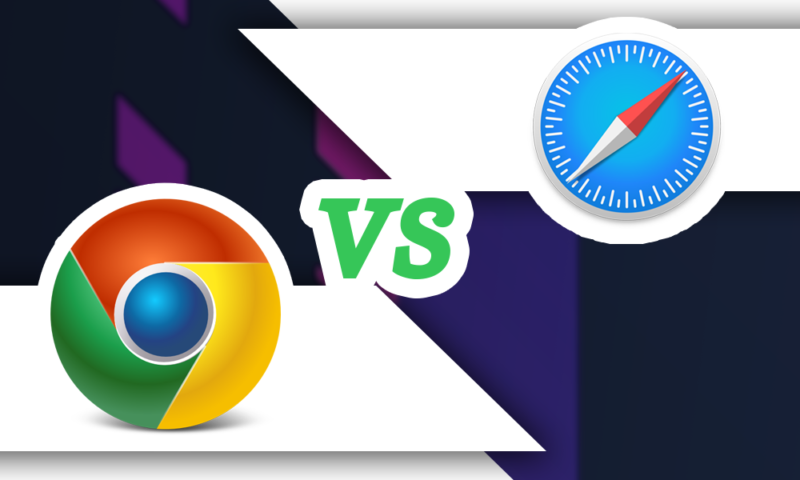
Safari and Chrome are two of the biggest players in the browser world. While Safari comes ready-to-go on Apple devices, that doesn’t mean it’s the best option — especially as Chrome is often touted as the best browser out there. See who wins in our Safari vs Chrome comparison.

Last Updated: 01 Feb'24 2024-02-01T09:54:22+00:00
All our content is written fully by humans; we do not publish AI writing. Learn more here.
It’s that time of year again where we put two of the most famous browsers in our virtual boxing ring for the battle of Safari vs Chrome. All Mac users will be familiar with Safari; it’s the default browser for Mac devices and iPhones.
However, just because Safari comes pre-installed by default, that doesn’t mean it’s necessarily the best. With applications available for the Google Chrome browser on both Apple desktops and iOS, you might be wondering if you should make the switch.

Key Takeaways:
- While Safari and Chrome are both decent browsers, Chrome’s vast library of extensions and customization capabilities means it’s a slightly better choice
- In the battle of performance, Chrome also comes up tops, offering better speed and graphics execution
- The only round where Chrome lags a little is privacy and browsing data collection, which is why we advise using this browser in conjunction with a VPN
To help you decide, we’ve done a bit of research for you, comparing Safari and Google Chrome across Mac and iOS to see which one is better. If you’re not a Mac user, then this article won’t be one for you, so we suggest you check out our Microsoft Edge vs Chrome review for Windows devices instead.
Cloudwards completed a fresh comparison of Safari vs Chrome. Since our last review, Chrome and Safari have remained relatively unchanged, making for a neck-and-neck race.
Safari vs Chrome: Rounds & Criteria
Our showdown between Safari and Google Chrome will take the form of five rounds, each focused on a different strength: features, ease of use, performance, security and privacy.
Check out our online security courses and grab a limited-time offer. Enrollment available now!
At the end of each round, one browser will come up tops and earn a point. Whichever of the two browsers scores three points overall will be the final winner. Is Chrome better than Safari? Let’s find out.
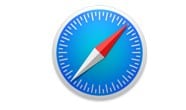
1. Features
First up in our Google Chrome vs Safari showdown, we’ll explore each of the browser’s features. It’s fair to say that Safari and Google both cover the basics of a good browsing experience pretty well but, in this day and age, most of us want more than basic functionality. Native tools, customization and extensions were all things we considered in this round.
Customization
Safari is pretty minimalist in design and functionality. While you can customize the look and feel of the browser on Mac, your options are limited. For example, you can change the background of the Safari home screen, but not the overarching color and theme of the desktop.
By contrast, Google Chrome gives you a lot more options. You can choose from over 24 color themes, or even customize your background with an image of your choice. It’s a similar story over on the mobile applications for both.
Safari’s home screen feels minimalist and static, while the Google Chrome mobile device app offers higher levels of customization. You can, for example, set your homepage to show you the latest trending news from Google News.
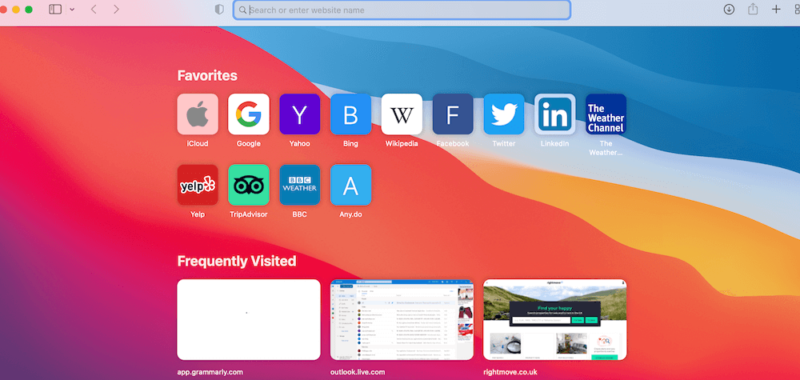
Google Extensions vs the Apple Ecosystem
Google Chrome also leads when it comes to extensions. Like Firefox, the Chrome extensions library is huge, varied and offers lots of applications for free. Read our Chrome vs Firefox review here .
Safari’s library of extensions, in comparison, feels relatively limited. While you can access big names like Honey and 1Password, you’ll also find that a lot of applications aren’t compatible with Safari.
This is especially true for VPNs. Right now, none of the top VPN providers offer a browser extension for the latest version of Safari, but they do for Google Chrome. In essence, Chrome offers much more expandability and customization than Safari.
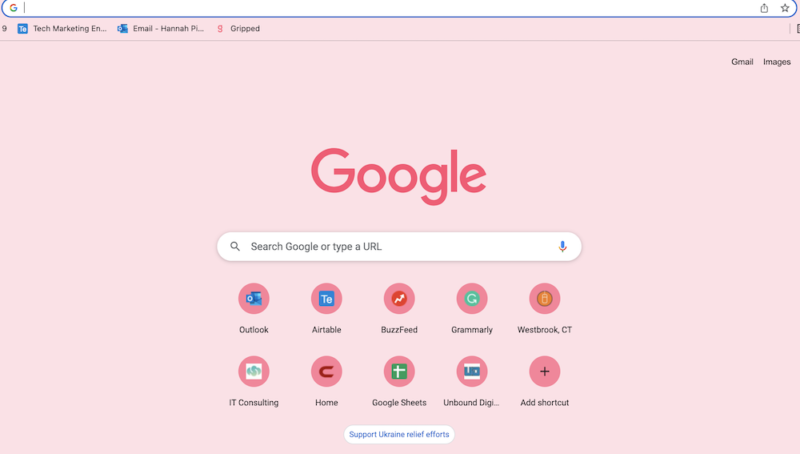
Syncing
Both web browsers offer solid syncing features. We like how Safari works in conjunction with a range of Apple features to offer a seamless browsing experience across all Apple products.
Combined with iCloud sync and Apple’s iCloud keychain software, you can move from your iPhone to your iPad to your Mac laptop without your browsing experience being interrupted, and your browsing history will also save automatically. Here’s the lowdown on how to get started with iCloud .
Safari also integrates into Mac’s other applications by default. So, if you use Mac apps like Apple Mail, Apple Calendar and iMessage, you’ll experience excellent continuity. We also like how, with compatible websites, you can use Apple Pay to pay for online shopping.
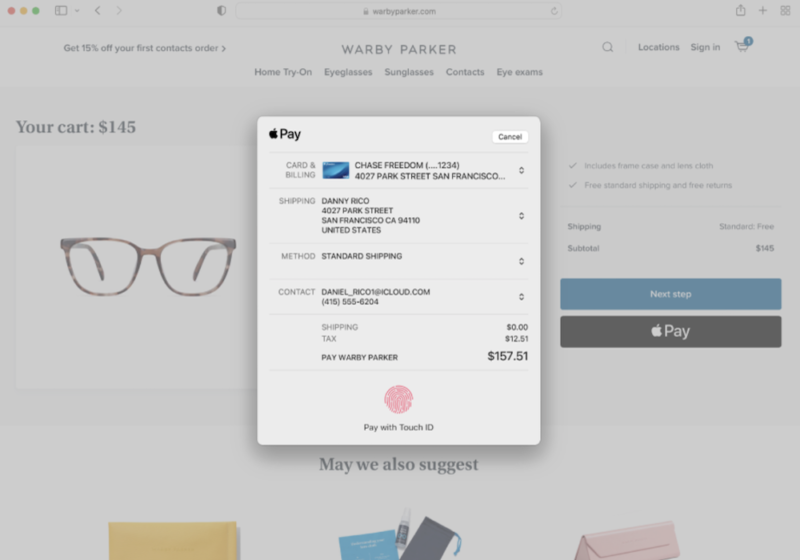
Google Chrome, though, also performs well on the continuity front. If you have a Google account, you can also sync your browsing experience across your other devices. While Google Chrome doesn’t enable Apple Pay, it has its own option — Google Pay — which you can enable for a faster payment experience.
So, Google Chrome and Safari are pretty much neck and neck when it comes to features but, with its greater levels of customization and vast library of web extensions, Google Chrome takes the lead in this round.
2. Ease of Use
Both Safari and Google Chrome are straightforward to use on desktop and mobile devices, so in this round, we analyzed which user interface felt more pleasant to use. Across iPhone and Mac, Chrome takes a slight lead here.
Safari’s user interface is minimalist and easy to get your head around. The search bar is at the top of the screen on both desktop and mobile. The home screen is then decorated with widgets showing frequently visited websites, favorite websites and suggested reading based on your browsing experience.
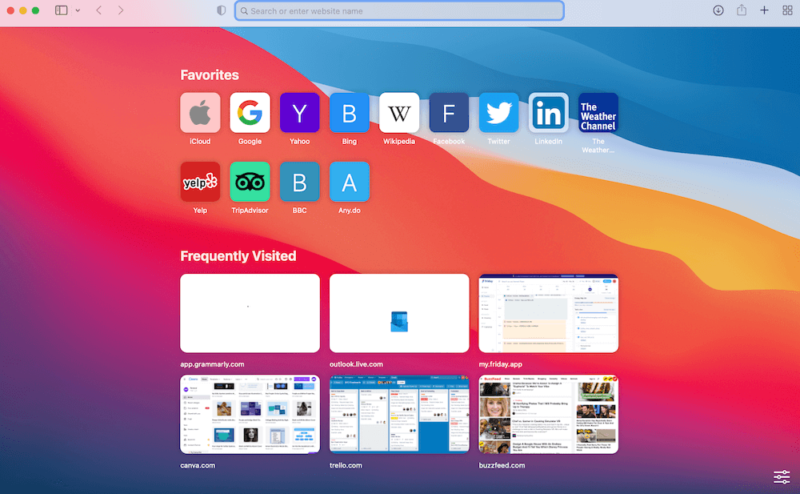
The experience is satisfactory and we also like how, if you open multiple tabs, you can click the four-square icon in the top right-hand corner of the browser to zoom out of all your open web pages, so it’s easy to find what you need.
Chrome is also really easy to use. The homepage — unless you change it — features the famous Google search bar, along with frequently visited websites below it. There’s also widgets in the top right-hand corner of the page, which give you quick access to Google applications like Gmail, Google Drive, Google Photos, Google Translate and YouTube.
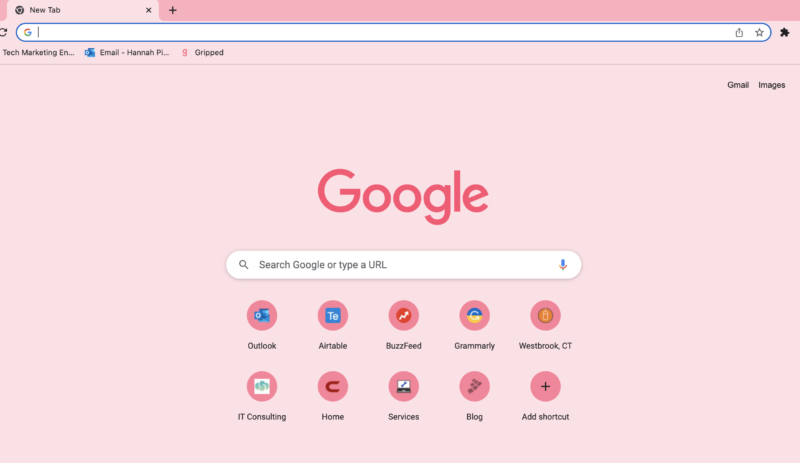
In terms of finding bookmarks, Google Chrome’s bookmarks are more seamlessly integrated into the browser, showing as small widgets below the search bar at the top of the page. To show bookmarks in Safari, you have to either manually click the bookmark tab in the control panel or enable the bookmark pane, which is quite big and invasive.
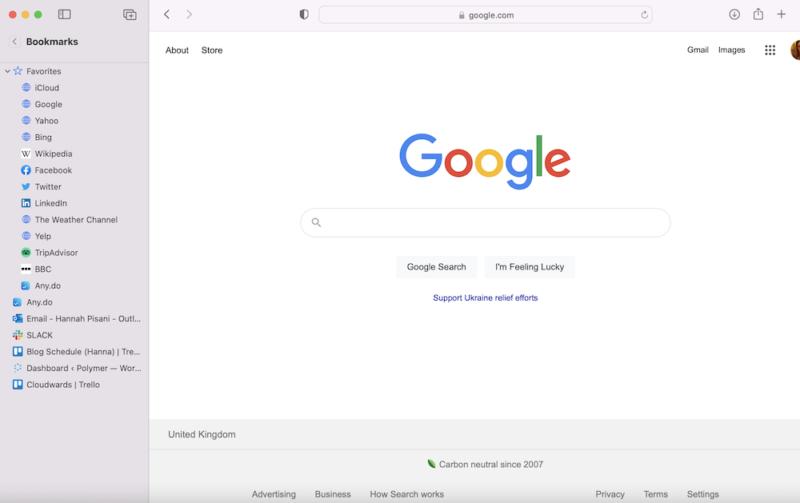
Overall, while both are easy to use, the Google Chrome browser feels a bit more dynamic and user-friendly than Apple’s browser.
3. Performance
We’ve come to what is arguably the most important round: the Safari vs Chrome speed test. We performed a benchmark test using Speedometer 2.0, JetStream 2 and MotionMark to compare Safari vs Chrome performance.
We used a MacBook Pro with 16GB of RAM and an Intel Core i5 CPU running at 2 GHz to run these tests.
Benchmark Test Results
When it comes to speed, Chrome is the clear winner, reading 122.5 compared to 113.8 on Safari. While both are respectable scores, Chrome is undoubtedly the faster option.
On JetStream, the tables turned. Safari’s reading was 125.705, putting it in the lead as Chrome’s score was 118.675. JetStream tests a browser’s ability to deal with complex JavaScript workloads. This indicates that Safari will perform better when executing complex applications — but only marginally.
The last test we performed was MotionMark, which analyzes how the browser handles complex graphics. Chrome really shone in this test, coming in at 403.6 to Safari’s 356.31. This means that Chrome’s user experience and responsiveness outperforms Safari.
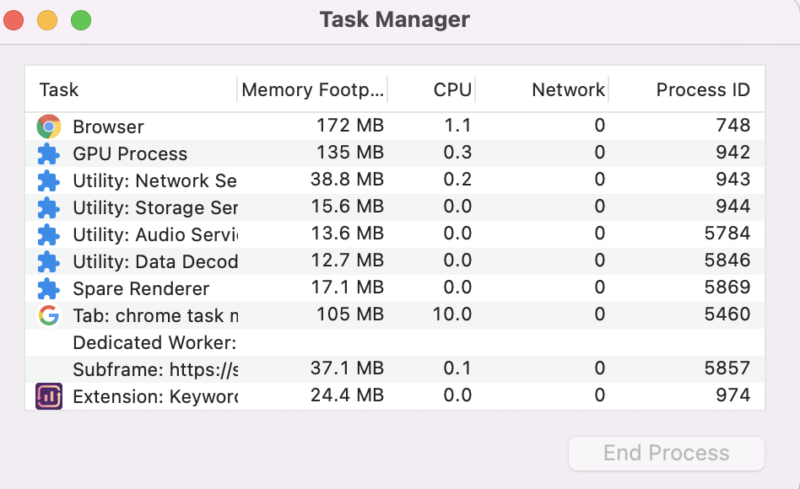
One thing worth noting is that Safari is a more lightweight browser than Chrome. While it might not be as quick, Safari is more economical for iOS and Mac performance than Chrome in terms of battery life, especially with multiple tabs open.
Despite this, with Chrome winning on two out of three of these mini rounds in the Safari vs Chrome benchmark test, it’s fair to say that Chrome is the overall winner when it comes to performance.
4. Security
Both Safari and Chrome use Google’s Safe Browsing database to keep users safe from phishing and malware. They also both offer password management functionality.
If you use Google’s password manager or Safari’s iCloud keychain, you’ll also benefit from dark web monitoring, a feature that uses data analytics to alert you to the exposure of your passwords and email addresses in data leaks and breaches.
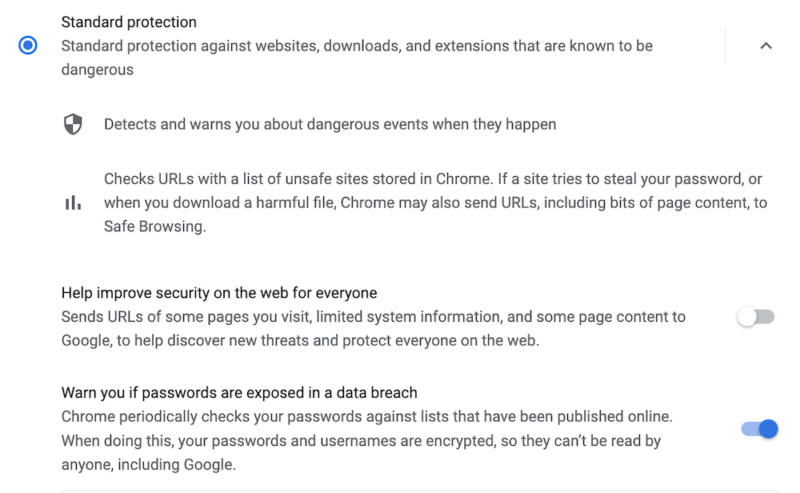
Despite these similarities, Chrome slightly takes the lead in terms of security features. We like that Google sends out frequent browser updates for Chrome, ensuring regular patching from potential vulnerabilities. Safari’s updates, by contrast, are much more infrequent.
Over the last few years, Google has gotten in trouble with data privacy regulators numerous times for its use of cookies and improper collection of personal data. Apple, by contrast, has managed to stay out of the headlines for these reasons.
We’ve taken an in-depth look at the best browsers for your privacy , which you can take a look at here.
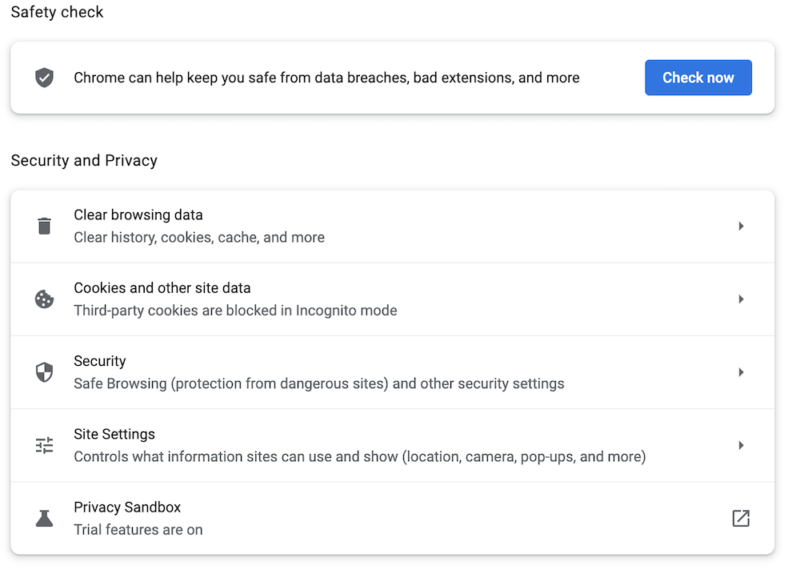
While Google appears to have learned from its mistakes and is taking steps to bolster user privacy, Apple takes the lead in this round. We like that Safari features a dedicated “privacy report” feature, which shows how the browser is protecting you from online profiling and cross-site tracking through its intelligent tracking prevention software.
Chrome also offers a “privacy checkup” function, but it’s far less granular than Safari. Also, by default, your privacy isn’t prioritized. Google automatically enables personalized ads, as opposed to blocking them. Incognito mode, as always, doesn’t do much do actually protect your privacy.
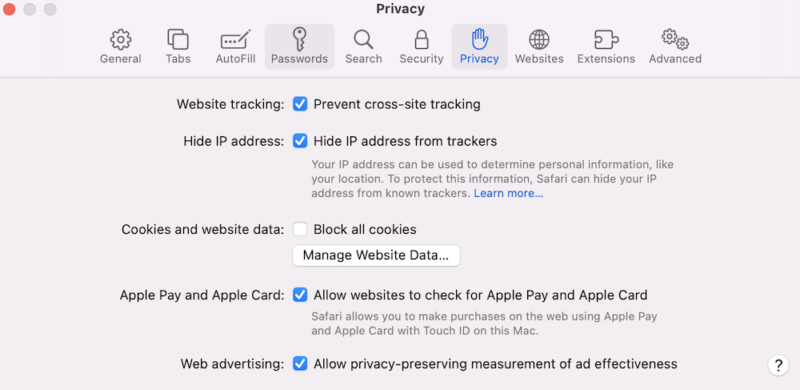
This makes sense, as advertising is such a huge part of Google’s business model, but it means that you should probably use a VPN in conjunction with Chrome. For this reason, Safari wins this round.
The Verdict
Ultimately, Safari and Chrome are both solid browser choices. For iPhone, iPad and Mac users looking for simplicity and deep integration across the Apple ecosystem, Safari is a good choice — and comes ready to go.
However, it’s also well worth downloading Chrome and setting up a Google account if you haven’t already. Chrome is a leading browser for a reason. It’s fast, easy to use and comes with unparalleled customization options.
Because of this, Chrome is our ultimate winner, but we do recommend you use it in conjunction with a VPN to ensure your online privacy.
What are your thoughts on the battle between Chrome vs Safari? Do you agree that Chrome is the better browser overall, and why or why not? Let us know in the comments. Thanks for reading!
Both Safari and Chrome are good browser choices for Apple users. However, Chrome takes the lead over Safari in terms of performance, ease of use and customization, making it a better all-round browser choice.
Safari and Chrome are both secure, and Safari actually uses Google’s Safe Browsing database. They are pretty much neck and neck when it comes to privacy and security, but if you’re concerned about your online privacy, we’d advise using a VPN.
Probably not. If you’re using Chrome, then Safari won’t offer you anything that you haven’t got already.
Great comparison, and I agree chrome wins in most everything. Review is missing a critical comparison, power consumption.
You mean on mobile?
I have win but I haven’t received any thing
I am pretty sure he means you didn’t include power consumption for desktop and mobile.
I use Safari because of the battery life and performance being pretty good. It does lack a robust extension store and isn’t cross platform outside of Apple’s OS ecosystem. Chrome has a significant market share on Mac OS because its cross platform and updates better if security is a priority for you. Safari lags in updates due to being tied to OS updates. WebKit is open sourced but mostly developed by Apple and is a fork of Chromium/Blink which Google and most other browsers use. Firefox is an option as well, but its always been slow and battery hungry as well.
Blink is actually a fork of WebKit, not the other way around.
fyi chrome uses safari’s rendering engine on iOS (as they’re not allowed to do otherwise) so speed is the same on iOS.
Firefox is much better nowadays in terms of performance and battery consumption (on MacBooks).
I Think Chrome is the browser with more day to day security and updates, for years I was a fan of Google Apps, but the fact that all of its apps are so resources’ hungry is annoying, I recently upgraded to 12GB RAM on my MacBook and the more RAM I add to my system the more RAM it uses, it’s incredibly annoying, when Safari handles everything faster with its simpler yet powerful and tidy design, using about 1/4 or less of the RAM used by Chrome, using the same websites, and the same amount of tabs open at the same time. Once I finish transferring my files from Google Drive I’ll switch everything to iCloud, it’s the way to go on a MacOS System.
Antonio, Please explain your like of Icloud. It’s the biggest annoyance.
It’s syncs seamlessly across all your devices – you can access them anywhere you can connect to the internet. It’s smart and even anticipates your needs, based on your file/folder usage behaviour.
If you’re finding it a massive annoyance then I imagine you’re *expecting* it to behave like Dropbox or Google Drive when that’s not what it was ever designed for.
Most people who find it frustrating do so because they don’t understand its purpose – I admit I fell in this camp for several years myself!
Took me years to realise that if you’re a Mac user, it’s pointless paying for eg 2TB of iCloud storage, if you don’t have 2TB of storage locally on your Mac. It’s not a storage extender like an external HD. It essentially replicates what’s on your Mac.
Not an ad, and am no way connected to him, but the ‘MacMost’ YT channel is an excellent free resource for both newcomers to Mac and experienced hands. Gary, the chap who runs it, has been around forever and watching his tutorial videos is like being taught by a friendly uncle. He has a rich, searchable back catalogue (with several on understanding iCloud!)
Regarding Chrome, I still love it – chiefly because of the vast library of extensions. I have 105 installed, but I’ve become far stricter about not keeping them all switched on all the time. I generally have about 12-15 on constantly; the rest I toggle on and off just when I need them. Seems the best of both worlds to me.
Chrome on iOS is more performant by safari. That is because, if you can choose safari, you have iOS. On iOS, chrome is always faster because it uses the same browser engine, webkit, with its own code to make it faster.
If you are on an Android phone with Google sync all across Google & Android products, Chrome is the winner!
The security on safari seems a little more liable other wise both are best but customisation wise chrome is a bit good
Liable to whom, and for what exactly? Or do you mean reliable? I’m unsure… Liable means legally responsible – do you mean Safari is run in a more legally compliant way? Please can you elaborate? Thanks
I reverted to Safari after I found that I couldn’t get a reader mode with Chrome for my iPhone and iPad.
Insert/edit link
Enter the destination URL
Or link to existing content
- The Best iPhone VPN in 2022: Protect Your iOS Mobile Device
- Kape Technologies Buys ExpressVPN: What You Need to Know in 2024
- 2024 VPN Speed Comparison: 7 VPNs Tested for Upload, Download and Latency
- What Is ExpressVPN Aircove Router & How Does It Work in 2024?
- 10 Reasons Why Parental Control Is Important in 2024 and Reasonable Ways to Guard Your Child’s Online Activity
- The 7 Best Parental Control App Options for 2024
- Accessories
- Meet the team
- Advertise with us
- Privacy Policy

Choosing the right web browser for our devices is essential for productivity and efficiency. Safari and Chrome are two popular choices on Apple devices, each with strengths and weaknesses. In this blog, I will compare Safari vs. Chrome to help you decide which browser is better for your iPhone and Mac. Let’s dive into the differences!
Safari vs. Chrome – User Interface
Safari is designed to blend seamlessly with Apple’s ecosystem. Its sleek and intuitive user interface ensures a clutter-free browsing experience. Besides, it offers group tabs management for organizing your browsing. So you can easily focus on the content.
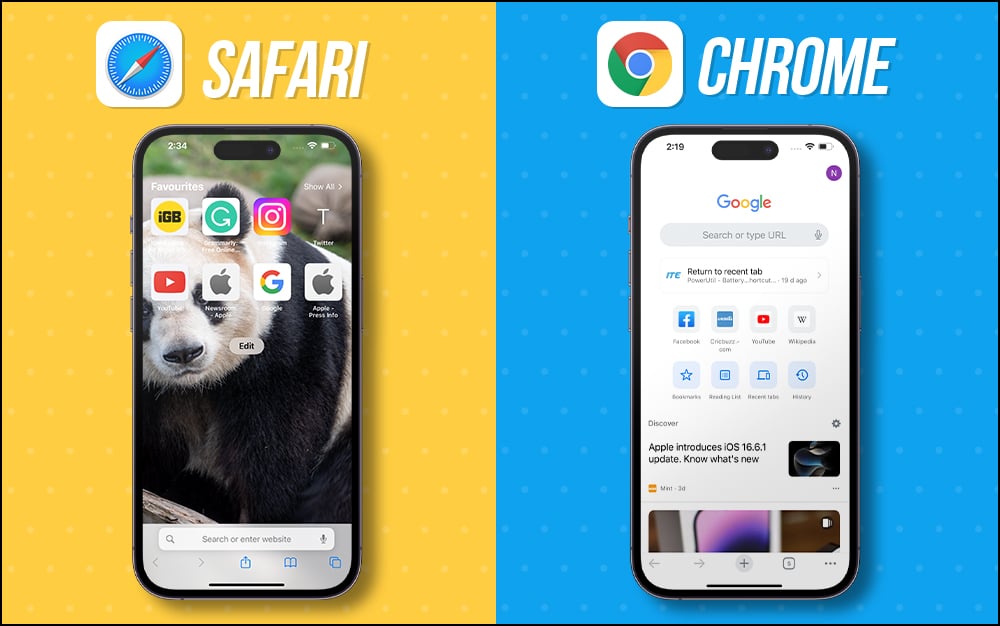
Chrome’s UI is user-friendly, with a familiar interface across devices. It lets you personalize your browsing experience with various themes, extensions, and add-ons. Nonetheless, this added flexibility might come at the cost of a more cluttered than Safari.
Therefore, both Safari and Chrome have strong UI aspects. But the winner depends on your preference for minimalism (Safari) or customization options (Chrome).
Safari vs. Chrome – Ease of use
Safari is the default browser on Apple devices. So, it offers seamless integration and synchronization with other Apple services. The intuitive gestures make it easy to navigate and use the browser effortlessly. With Smart Search, you get more relevant results without going through multiple websites. Additionally, you can quickly autofill your passwords and verification codes, saving time and effort.
With its widespread popularity, Chrome ensures a consistent experience across different platforms. The synchronization with Google accounts, bookmarks, and history is convenient for users already within the Google ecosystem.
If you own both Apple, Android, and Windows systems, Chrome will be your go-to browser. However, I only have Apple devices, so I prefer Safari to take up the work where I left it. Also, Safari allows me to create profiles to keep my personal and professional browsing separate.
Safari vs. Chrome – Performance and speed
As Apple optimizes Safari for its devices, it often outperforms Chrome regarding speed and battery efficiency. Safari’s performance is particularly notable on iPhones and Mac devices. I have experienced smoother browsing and longer battery life using Safari.
Chrome has made significant improvements in performance over time. However, it can still be resource-intensive, especially on older devices. While it performs well on Mac, it might not be as efficient on iPhones as Safari.
Safari vs. Chrome – Security
Apple strongly emphasizes user privacy and security. So Safari has built-in Intelligent Tracking Prevention and strong sandboxing. It also warns against unsafe websites, ensuring a secure browsing environment. Moreover, you may hide your IP address for data protection. With iOS 17, Safari automatically removes tracking parameters from URLs .
Google’s Chrome also focuses on security, with features like Safe Browsing and automatic updates. Besides, you may save your passwords securely and access them on any device using Chrome Password Manager . However, its ties to Google’s services raise data collection and privacy concerns.
Safari vs. Chrome – Privacy
As mentioned earlier, Safari prioritizes user privacy by blocking cross-site tracking and preventing advertisers from collecting user data. It also includes a “ Privacy Report ” feature to get insights into trackers blocked on visited websites. Besides, you can lock your incognito tabs for more privacy.
You can use Hide My Email to create unique, random email addresses that will forward messages to your inbox without revealing your actual email address. Also, you may create or delete as many addresses as needed to enjoy greater control over who can contact you.
While Chrome offers some privacy controls, it cannot match Safari’s level of privacy protection. As part of Google’s business model, Chrome collects user data to improve its services, raising concerns for privacy-conscious users.
Safari vs. Chrome – Customization
Safari’s customization options are relatively limited compared to Chrome. You can only customize the Safari start page and a few website settings. While you can install some Safari extensions , the selection is not as extensive as in Chrome’s Web Store.
Chrome’s extensive Web Store offers a vast collection of extensions, themes, and add-ons that allow users to tailor their browsing experience to their preferences.
Additional features
Safari offers Reading List , Listen to Page, PiP mode , and Handoff features to enhance the browsing experience. Also, it has a built-in PDF conversion tool to convert any webpage into a PDF. This is pretty convenient to save web pages. Besides, you can quickly share your password with family members without explicitly sharing them.
Chrome’s additional features include Google Assistant integration, cross-device synchronization with non-Apple devices, and easy access to Google Workspace. Another standout feature is the feature to do a reverse Google search on any image instantly.
Which browser is better for iPhone and Mac?
Choosing the better browser between Safari and Chrome for your iPhone and Mac depends on your priorities and preferences. Safari is ideal if you value seamless integration within the Apple ecosystem, strong privacy protection, and optimized performance. However, Safari is only limited to Apple devices.
On the other hand, you may prefer Chrome if customization options, a wide range of extensions, and additional features are more important to you. Therefore, if you want to use Chrome on your Apple devices, you may change it on your iPhone and Mac .
Ultimately, whatever you choose, both browsers will provide a satisfying browsing experience on your Apple devices. Which browser is your favorite? Let me know in the comments below!
Explore more…
- Best web browsers for Mac
- 40+ Safari tips and tricks for iPhone
- Safari crashing on Mac? Easy ways to fix it!
Ava is a die-hard Apple aficionado and seasoned writer with a knack for breaking down complex tech concepts into easily digestible content. Having honed her writing and editing skills over 3 years at renowned media houses like TechBurner, Ava crafts informative and engaging articles including troubleshooting guides, product reviews, editorials at iGeeksBlog. When not typing, you can find her exploring the latest Apple releases or pondering the future of tech innovation.
View all posts
🗣️ Our site is supported by our readers like you. When you purchase through our links, we earn a small commission. Read Disclaimer .
LEAVE A REPLY Cancel reply
Save my name, email, and website in this browser for the next time I comment.
Related Articles
Does walmart take apple pay (2024 guide), what is tandem oled on m4 ipad pro everything you need to know, what is nano-texture glass on m4 ipad pro and is it worth it, apple pencil pro vs usb-c, 2, and 1: which apple pencil should you buy.
- Apple Watch
- Accessories
- Digital Magazine – Subscribe
- Digital Magazine – Info
- Smart Answers
- 11th-gen iPad
- New AirPods
- Best Mac antivirus
- Best Mac VPN
When you purchase through links in our articles, we may earn a small commission. This doesn't affect our editorial independence .
The best iPhone web browsers

Which is the best web browser for the iPhone? Safari is the default option pre-installed on every new iOS device, but there are plenty of excellent alternatives. In the past, Safari held a considerable advantage, due to the fact that it was impossible to change the default browser, but since the launch of iOS 14 you can now choose which one opens when you click on links.
With this in mind, we’ve tested and rated seven of the best third-party browser apps, all looking to take the crown from Apple’s own Safari.
If you want to learn how to switch default browsers, as well as email and music apps, take a look at how to change your iPhone’s default apps . Or, if this inspires you to try a new desktop browser too, find out what we think is the best Mac browser .

Pros: Based on the same ‘design language’ you will experience throughout the rest of iOS, meaning many features and defaults will feel more natural to use. Tightly integrated with iPadOS, macOS and watchOS
Cons: Behind rivals on some features
What about the built-in Safari web browser? Safari is behind its rivals on certain features and no doubt has its critics, but there are some big reasons to stick with Apple’s own browser.
For a start, Safari is integrated into iOS in more intangible ways than other browers – the overall design aesthetic, for example. This means that Safari feels like a natural extension of the iPhone and its menus and settings. We love that we can create a link to a particular web page and have it as an icon on our Home screen, for example. (To do that, tap on the Share icon and choose Add To Home Page).
If you want to surf the web incognito you can just tap on the tab in the bottom right to open the tabs view and then tap on the Private button on the bottom left to open a new private page – you can tell it’s private if the URL bar is grey.
Safari boasts a great Reader mode that can turn busy websites into simple text pages to read more easily, plus you can add articles on web pages to your Reading List where you can come back to them later when you’ve got more time. There’s also the Handoff feature, which allows you to pick up where you left off when you move between iPhone, iPad and Mac, not to mention iCloud Keychain, which securely holds your passwords for sites and shares them across devices logged into your account.
Finally, there are the advantages held by any incumbent: it’s the easiest option, since it’s preinstalled and you don’t need to invest any time looking into alternatives; and it’s comfortable, because you’re already used to the way it works. All the other browsers here will require some getting used to – but if you find one that’s worth sticking with that’ll be a one-off investment.

Pros: User-friendly tab organisation and navigation; many useful features
Cons: Google-phobes may dislike the company’s tendency to track and sync, and if you don’t want to sign in you lose some of the advantages
Google’s Chrome browser for iOS is well made and a pleasure to use, particularly if you’re deeply entrenched in Google’s ecosystem. If you use Chrome on the Mac, for instance, you can sign into Chrome on both and sync your tabs, reading lists, bookmarks and passwords.
Chrome includes a voice-search mechanism, translation capabilites to render sites readable no matter what language is used, plus there’s the option to enable Handoff so that you can move from iPhone to iPad to Mac without losing your place on a site.
Chrome’s tab management is excellent, with simple controls allowing you to quickly open new ones (regular or incognito), switch between them via a 2D flat-plan view, as well as access recently viewed pages. This all feels a little more modern than Safari’s dated 3D-page view for tabs.
The general interface is strong, too: back in the main view, tapping on the left or right arrows in the bottom corner takes you to previously viewed tabs, and we like the user-friendly ‘drag down to refresh’ that you get on all web pages – something we wish Safari would adopt.
Chrome offers to cut your data usage with a Data Saver optimisation mode which, according to Google, could reduce things by as much as 50%.
If you use Chrome as the browser on your desktop that’s a good reason to use it on your iPhone and iPad too. You will miss out on some iOS features built into Safari, such as Apple Pay and the general integration, but Google Pay is a good alternative.
The only real drawback is that Chrome is known to be something of a resource hog, using up RAM when running. But this tends to be more of an issue on the desktop than on iOS, as we didn’t experience much in the way of slowdowns even with multple tabs open.

Pros : Plenty of useful features; great for use with a Windows 10 PC
Cons : Requires Microsoft account to access full feature set; slightly blocky design
If you like Chrome but aren’t keen on the whole ‘Google having your data’ thing you might be interested in Microsoft Edge, aka Edge Chromium.
Back in 2020, Microsoft switched to the Chromium engine for its browser, hence a similar feel to Google’s Chrome app, but Edge has its own design and approach.
If you use a Windows 10 PC, then you’ll like how Edge allows iPhones and PCs to link together and exchange web pages, bookmarks, Cortana settings and a few other things. Edge also includes attractive features such as tracking prevention (which Chrome doesn’t offer) and the ability to block ads. You can also browse in private.
Edge is a fully fledged browser replete with tabs, password manager, reading list, language translator and plenty of additional goodies, plus you can sync your browsing history, open tabs, auto-fill data and passwords across various devices if they’re logged into the same Microsoft account.
A recent new addition is Collections, which acts as a Pinterest-style scrapbooking feature where you can select web pages and add them to themed folders. This is cool, especially if you’re planning an event, holiday or something similar.
It’s a great browser for Windows users, but pretty decent for everyone else too.
Opera Touch

Pros: Slimline design; Cryptowallet; built-in ad-blocker; made for one-hand use
Cons: No bookmarks or online syncing
Opera is widely understood to be the connoisseur’s choice of web browser software. It occupies only about 1% of the browser market on desktop, but its users claim (not without some justification) that it’s the best product around.
On iPhone, Opera now has the Touch browser, seemingly replacing all that came before with a slimline app focused on speed of use, simplicity, and a one-hand interface.
The company states that this was designed primarily for use on the go, which explains the rather sparse, if admittedly interesting, layout. The controls centre on a purple circle that resides at the base of the screen. Tapping this once will cycle through either the browser’s Home screen or the last tab that was open.
Holding the button down opens a quick menu where you can open a new tab, close the current one, access all open tabs, go back to the previous page, start a search or send the page to your ‘Flow’, a feature that we look at below.
Opera has decided to leave bookmarks out of Touch, which is a controversial decision, so if you’re heavily reliant on lots of folders and links then this isn’t the one for you. It does provide a history of your browsing, plus there’s the aforementioned ‘Flow’ feature where you can link the Touch app to a desktop version of Opera and send articles and web links back and forth.
Curiouser still is that while Touch has a stripped back, mobile-first approach to features, the company has seen fit to add a built-in Cryptowallet that can handle cryptocurrency such as Ethereum. Add to this the ad-blocker, pop-up stopper and cryptomining protection, and you have a strange new breed of browser, albeit one we find quite intriguing.

Pros: Free unlimited VPN; gesture control is both convenient and cool; solid privacy protection
Cons: Best VPN features requires signing up to (admittedly inexpensive) premium tier
Cake is one of the newest entries on this list and is unusual in that it doesn’t have a desktop counterpart. With this mobile-focused approach, the developers have employed a heavily gesture-based interface that actually works rather well.
For example, when you search for something online, swiping left and right loads each linked page that appears in the results, so you can quickly find the site you’re after. It’s a simple idea, but it seems crazy that we’ve not come across it before.
When you find something you like, tapping the Menu icon on the bottom row opens a small pane where you can select from a number of options, including Adding it to your bookmarks or Pinterest-style Collections, using the Find on Page feature to locate specific text, saving images or even opening the page in Safari.
Cake has plenty of privacy protections, with tracking blockers, ad-blockers, Force HTTPS, passcode protections, plus a built-in free VPN.
The latter is a nice touch, but if you want faster servers, the option to select where the server is located, not to mention being able to use the VPN with any app on your device, then you’ll need to move to the Premium tier which costs £1.99p/m or £19.49p/a.
This is a good alternative to Safari with plenty of interesting ideas. Now, a desktop version would be the icing on that Cake.
Firefox Focus

Pros: Blocks ads, analytics, social and tracking data, making it one of the most security-focused browsers on iOS; simple to use
Cons: No history, menus or tabs; very basic browser
Firefox Focus is a browser that puts privacy at the top of its agenda, and we found it did exactly what it said on the tin (or App Store), in that it blocks a wide variety of trackers, allows you to easily clear your history and putting you in control of your internet history.
However, it is limited – you lack a history, menus, or even tabs! This is a major drawback, but if security and privacy are the most important things on your agenda it’s a compromise you may want to make.
Should this be too much of a sacrifice, there is still the normal Firefox browser which boasts a full complement of features and plenty of additional tools.

Pros: Very strong privacy and anonymity features
Cons: Nature of app means it isn’t feature-rich
If you don’t like advertisers tracking your browsing habits, Ghostery is the browser for you.
The app is designed with privacy – and anonymity – as its primary aim. There are no cookies, no signups and no collection of user data by the app itself (unless you opt in to provide anonymised data to help Ghostery compile its database). And if the web page you’re on is using any ad trackers, Ghostery will spot them and report how it has protected you.
It’s a little on the basic side for power users, but if you just want to surf the web without worrying about who is monitoring your activities, then you should at the very least download Ghostery as an accompaniment to Safari.
Duck Duck Go

Pros: Keeps you safe online; clears all history and data when you finish using app; can leave specific sites untouched
Cons: Simple feature set
Another champion of protecting people’s online activities is Duck Duck Go. You may know it as one of the alternative search engines you can use in Safari and other browsers, but the service also has a dedicated app of its own.
Like Ghostery, Duck Duck Go employs various privacy tools to keep your browsing anonymous and safe. When you’re finished using the app you can tap the Fire icon on the main page, which will then close all tabs and delete the data (cookies, browsing history, etc) so that you leave no trace behind.
If you want, you can mark certain sites as Fireproof, so that they will maintain your login details and cookies, making the app usable day to day rather than just as a burner.
DuckDuckGo is a simple app that keeps out of the way but watches your back.
Author: David Price , Editor

David has loved the iPhone since covering the original 2007 launch; later his obsession expanded to include iPad and Apple Watch. He offers advice to owners (and prospective owners) of these devices.
Recent stories by David Price:
- Report: iOS 18 to get a big AI boost with ChatGPT integration
- How to call someone who blocked your number on iPhone
- iPhone 14 and iPhone 14 Pro: Where to get the best deals
Safari vs. Chrome: Best Browser for Mac in 2024
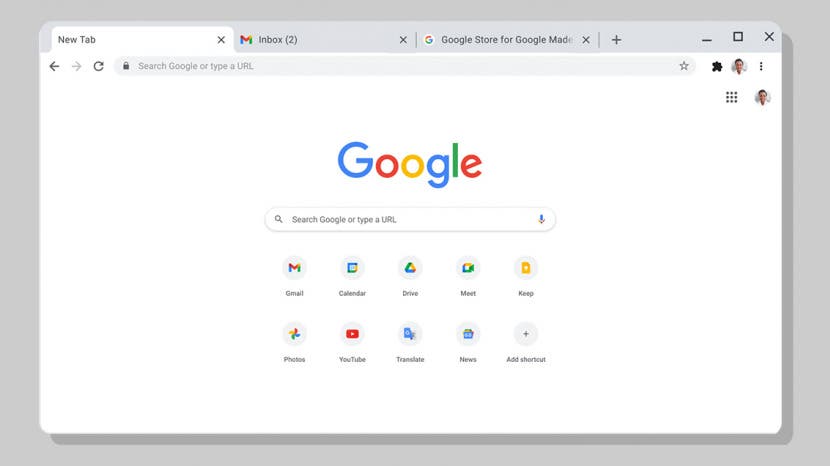
Does using Google Chrome for Mac computers make sense? Or should you go with the default Safari web browser? Since most of the time users spend on a Mac involves browsing, the Safari vs. Chrome debate is a big one! I’ll cover the pros and cons of each browser and I’ll teach you how to download Google Chrome on MacBook Pro, MacBook Air, and iMac!
What's in This Article?
- Best Browers for Mac Computers
- Safari vs Chrome: Pros & Cons
- How to Download Google Chrome on MacBook
Best Browsers for Mac Computers
Is Safari better than Chrome? It depends. The best browser for Mac depends a lot on your experience. Safari comes pre-installed on your Mac and on your other Apple products. Recently, it was completely upgraded with the macOS 12 Monterey update. Safari offers many great features, and it is the most power efficient browser for your Mac. However, Google Chrome is also an excellent option.
Google Chrome does not come pre-installed, and many users won't find it in their App store, which leads to questions like, "Can I download Google Chrome on MacBook Air, MacBook Pro, and iMac?" The answer is yes!

Google Chrome is a popular browser for Mac users because it has an abundance of powerful extensions and many ways to customize your browser. Additionally, Chrome is made for all kinds of devices, not just Apple. This comes in handy if you use Macs at home but PCs at work or vise versa.
Safari Browser Review
Safari is the default browser on all Apple devices, including on Macs. The recent updates make Safari a fantastic browser with lots of new customization options, security features, and so much more. One of the most exciting upgrades is iCloud Plus Private Relay , only available on Safari and gives the browser a notable privacy boost.
Since Apple designed Safari to work with its devices, it is obviously better integrated into the Apple ecosystem than a third-party browser. This has its perks, such as having the new Shared With You section built into the browser. Also, Safari is the more energy efficient browser, so using it instead of Chrome can help extend battery life and Mac performance in general.
Related: How Do I Upgrade My Browser on My Mac with macOS 12 Monterey
Chrome for Mac Review
Like many users, I have used Google Chrome as the default browser on my Mac for years. My favorite feature is having multiple profiles logged in to switch between work and leisure content with a click. Plus, Google Chrome offers invaluable extensions that are either not provided or have been discontinued on Safari, such as TubeBuddy.
On the other hand, Chrome uses ridiculous amounts of CPU, which can slow down your computer, make it overheat, and drain your battery faster. In fact, when I updated to macOS 12 Monterey, I couldn't use Google on my 2020 MacBook Air without experiencing frequent system crashes. So is Google Chrome worth it? Below are some pros and cons that can help you decide!
Safari vs Chrome: Pros and Cons
There is no clear to answer to which web browser is best, as this is highly subjective. The following pros and cons can help you device for yourself:
Pros: Google Chrome for Mac Computer
- Google Chrome has significantly more extensions than Safari; these can help improve privacy, save you money online shopping, and more.
- Google Chrome can run on all operating systems, while Safari is not an option for Linux users.
- Chromecast or Google TV users can enjoy direct casting from Google Chrome.
- It is fast, although not necessarily quicker than Safari. Both beat other third-party browsers such as Microsoft Edge.
- Google Chrome gets more frequent security and privacy updates than Safari to minimize security breaches.
- Many consider Google Chrome easier to navigate than Safari, although both browsers are relatively easy to use.
Cons: Using Google Chrome Browser for MacBook
- Google Chrome uses significantly more CPU than Safari and is less energy efficient to the point of causing issues on older or slower Macs.
- Google Chrome has openly stated that it collects and uses browsing data, while Apple has minimized app-tracking and improved users' overall privacy experience.
- Google Chrome doesn't support all macOS operating systems, only newer ones, so not all Mac users can download and use it.
- Although it has its own password management, Google Chrome can't be synced to the iCloud keychain.
- Google Chrome doesn't automatically offer the Hide my Email feature like Safari does, resulting in more spam and potentially dangerous emails.
- Google Chrome doesn't work in countries where Google is banned, such as China, so if you live there or are planning a trip, you'll have to use Safari or another browser.
In the past, Google Chrome was considered more customizable. However, with the new updates to Safari, including tab groups, Safari is now the more customizable of the two browsers, which complicates the Safari Chrome debate.
How to Download Google Chrome on MacBook Pro, MacBook Air, or iMac
Even though Safari is a great browser, there are many reasons why you may consider trying a different browser. Some, like Google Chrome, may not be available in the App Store, but you can still download it. Here's how to download a new browser on Mac:
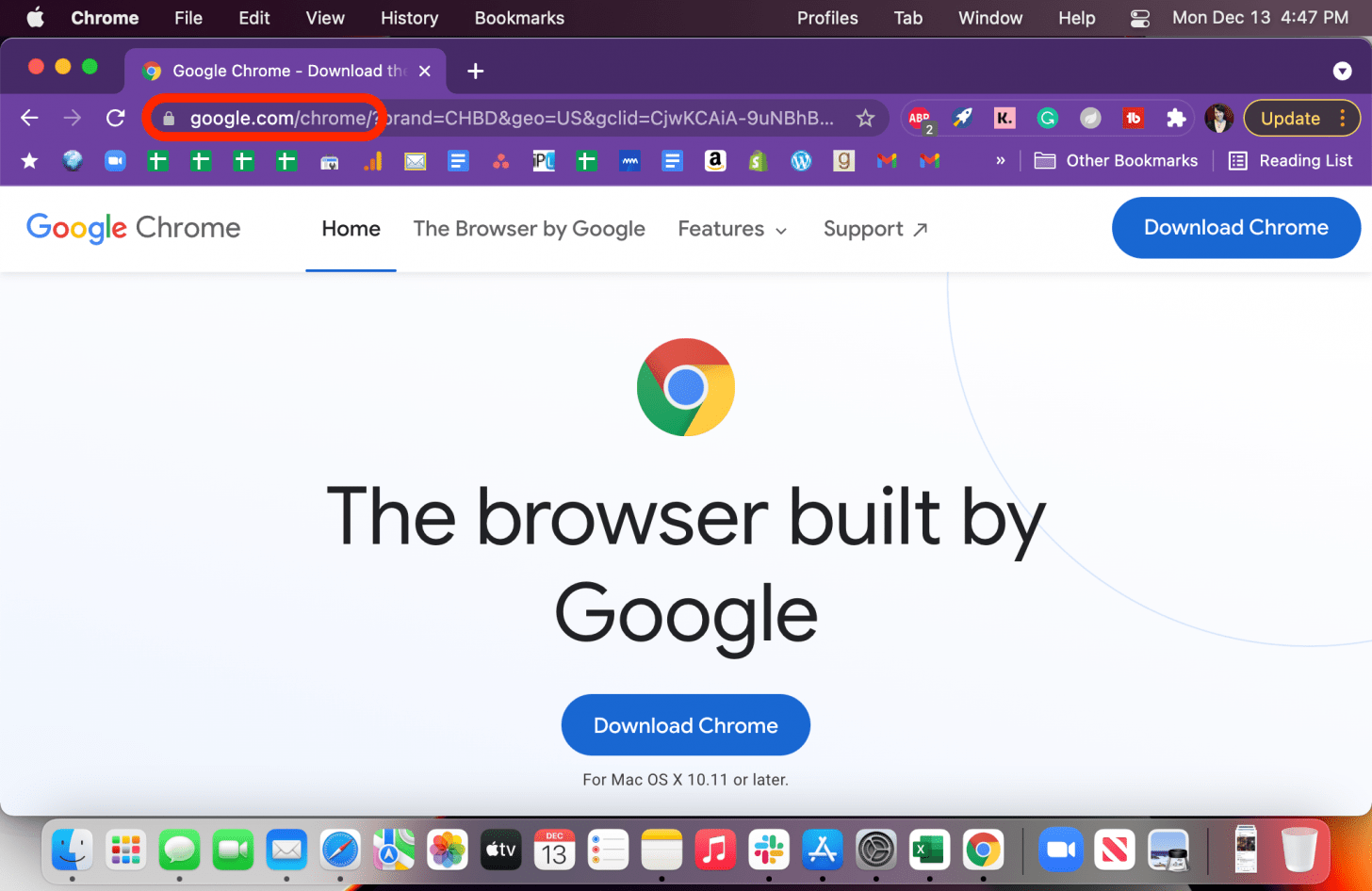
- Follow the on-screen directions to finish the installation.
Once you’ve installed Google Chrome on your Mac, it still won’t be your default browser. Here are two articles that will teach you how to change browsers on MacBook or how to change default browsers on iPhone .
Author Details

Emma Chase is a freelance writer for iPhone Life. She has her Bachelors degree in Communication from the University of Northern Iowa. Emma has worked in many sectors in her professional career, including the higher education, finance, and nonprofit. Emma lives in small-town Iowa with her husband and two children. When she’s not geeking out over the newest Apple product or wrangling her kids, Emma enjoys a good book, crocheting, and trying new foods.

Article Spotlight
Matias is launching a brand new keyboard based on a classic design.

The Matias Sculpted Ergonomic Keyboard improves on the legacy of the beloved Microsoft Sculpt Keyboard with upgrades that make it more functional and comfortable than ever before! The Matias Sculpted Ergonomic Keyboard stays true to the spirit of the discontinued Microsoft original.
Featured Products
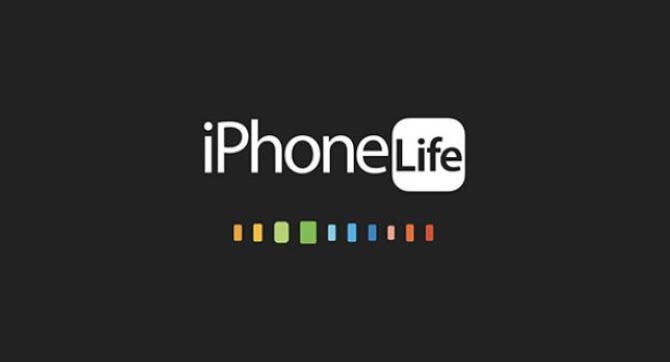
In episode 211, David and Donna cover Apple's "Let Loose" event that went live on May 7th, 2024. This event was all about the new supercharged iPads. From the AI-focused M4 chip to inky-black OLED, tune in to find out if it really is the biggest iPad update since its original release! Listen now and find out !
Most Popular
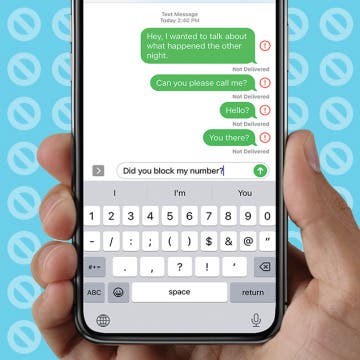
How to Tell If Someone Blocked Your Number on iPhone
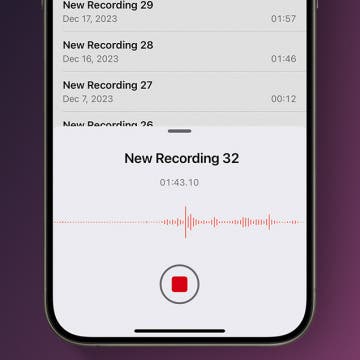
How to Record a Phone Call on an iPhone for Free
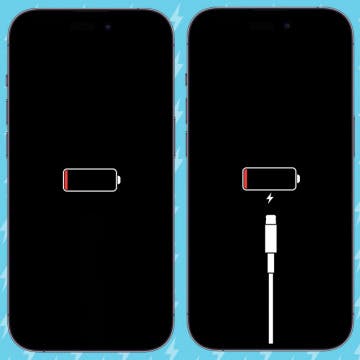
How to Tell If a Dead iPhone Is Charging
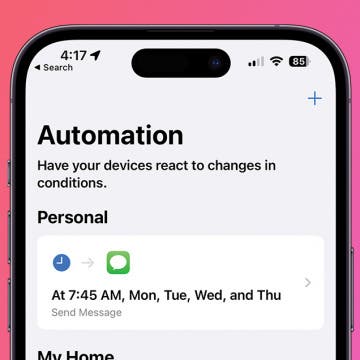
How to Schedule a Text Message on iPhone

How Many iPhones Are There? iPhone Model History
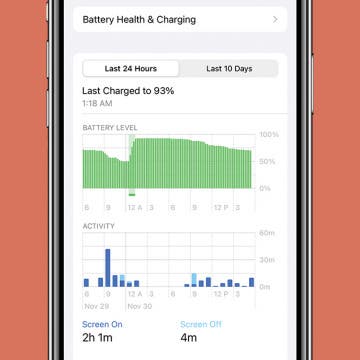
10 Simple Tips To Fix iPhone Battery Drain

How To Put Two Pictures Together on iPhone
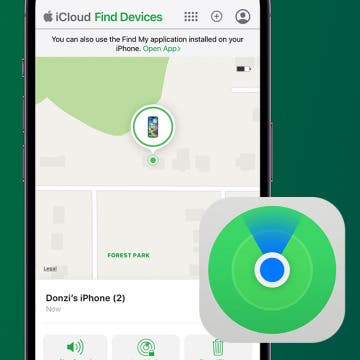
How To Find My iPhone From Another iPhone
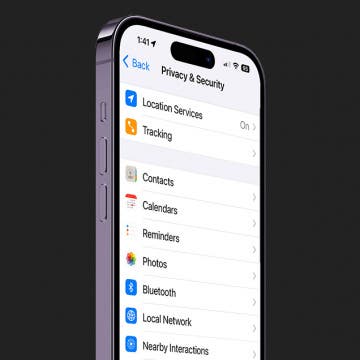
Can iPhones Get Viruses? How to Detect & Remove Malware (iOS 17)
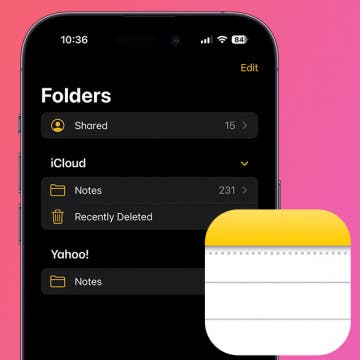
iPhone Notes Disappeared? Recover the App & Lost Notes
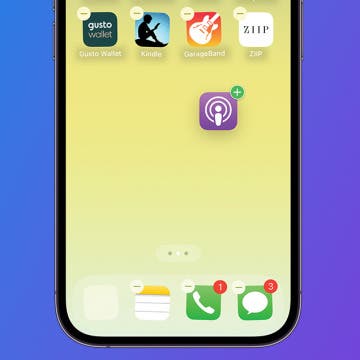
How To Get an App Back on Your Home Screen

How to Adjust Exposure in the iPhone Camera App
Featured articles, the history of every iphone model from 2007–2024.

How to Find a Lost iPhone, Even If It's Dead or Offline
Symbols on an iPhone & Their Meanings
How to find someone else's iphone when it's lost.
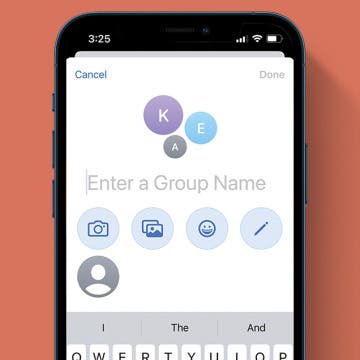
How to Name a Group Text on iPhone (iOS 17)
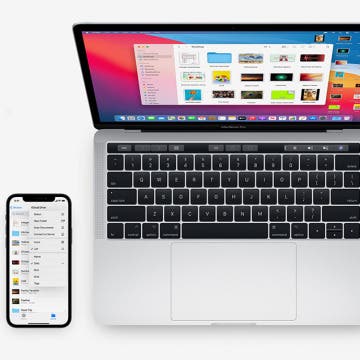
How to Transfer Photos from iPhone to Computer—PC or Mac
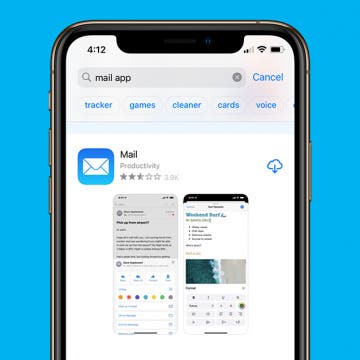
Email App Disappeared from iPhone? How to Find & Restore It (iOS 17)
Check out our sponsors.

- Each email reveals new things you can do with your phone (and other devices) with easy-to-follow screenshots.
- Enter your email to get your first tip immediately!
Safari vs Chrome: Which One Is Better for Mac/iPhone/iPad/Android
Both Safari and Chrome are famous browsers. Some users want to know the differences between them and wonder which one to choose. Now, this post from MiniTool provides details about Safari vs Chrome.
Safari and Google Chrome are both popular browsers on the Mac, but which is better? Does it make sense to use Google Chrome on a Mac? Should you use the default Safari web browser? This post will provide details about Safari vs Chrome in 4 aspects – user interface, features, performance & speed, and security & privacy .
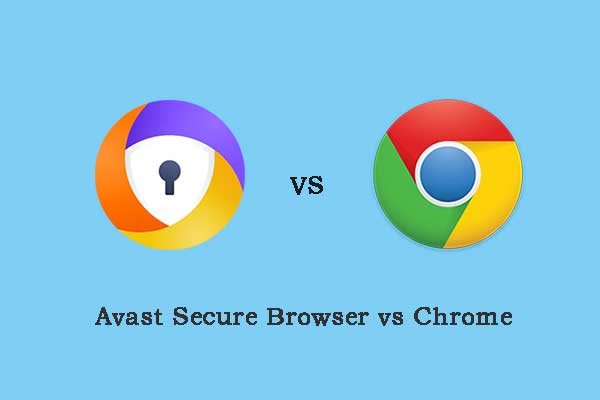
If you want to learn information about Avast Secure Browser vs Chrome, this post satisfies your demands. Keep on your reading.
Safari vs Chrome: User Interface
The first aspect of Safari vs Chrome is the user interface. Both Safari and Chrome are beautiful and easy to use. Their differences mainly come from their respective ecosystems.
In Safari, you’ll find a grid layout that makes it easy to find any tab on the desktop in seconds. However, Safari turns its tabs into a deck of cards on mobile, requiring you to swipe through an endless list. You can only see the top of each tab, which can be confusing if you have multiple tabs open from one site.
Google Chrome is designed to be the centerpiece of ChromeOS and generally handles more tasks. It works better with a lot of tabs open and can manage a lot of bookmarks efficiently. You can even quickly switch between work and home profiles (or others in your house), and all preferences are automatically adjusted.
This, in this aspect, they make a tie. Users who don’t like clutter will find Safari more appealing, while power users will find Chrome easier to manage.
Related post: How to Switch Tabs in Chrome | Switch Tab Shortcut
Safari vs Chrome: Features
The second aspect of Safari vs Chrome is the feature.
One of the great things about Safari is its integration with the Apple ecosystem. If you have an iPhone, you can instantly open the same tabs on your Mac through iCloud tabs. You can also confirm online purchases in Safari using your Mac’s Touch ID and Face ID technology. One of Safari’s best features is its Reader Mode, which lets you define your own reading experience with custom backgrounds, fonts, and text sizes.
If you have an Android device or use a Windows OS (Windows doesn’t have Safari), Chrome is a better fit. It also works seamlessly with Chromecast, so you can easily stream anything from your computer to your TV. Additionally, Chrome is tightly integrated with other Google apps like Google Translate, allowing you to translate any webpage into any language in seconds.
In short, Apple users may prefer Safari, while international Android users prefer Chrome.
Safari vs Chrome: Performance & Speed
Then, let’s see Google Chrome vs Safari in performance and speed. With each release of macOS, Apple has integrated Safari more deeply into its system, making it faster and more resource-efficient. If your device is underpowered, Chrome may not run smoothly. Due to its huge resource-intensive nature, it not only slows down the device but also drains the battery.
Safari vs Chrome: Security & Privacy
This part is about Safari vs Chrome on Mac of security & privacy. Both Safari and Chrome use Google’s Safe Browsing database to protect users from phishing and malware. They also both offer password management capabilities.
If you use Google’s Password Manager or Safari’s iCloud Keychain, you’ll also benefit from Dark Web Monitoring, which uses data analytics to alert you to data breaches and exposures of your passwords and email addresses.
Google Chrome, on the other hand, does have strong phishing and malware protection and gets security updates almost every week, while Safari is usually updated annually, with the occasional mid-term patch.
Safari vs Chrome: Which One to Choose?
After knowing the differences between Safari and Chrome, you may wonder which one to choose.
Safari is limited to Apple devices, so it’s the best option for those who use multiple Apple devices for a great cross-device experience. However, if you have one Apple device and another Windows or Android device, then Chrome may be a better choice as it works on all platforms. While Safari is Apple’s default browser, you can change it on iPhone and Mac.
Notably, Safari is better optimized for iOS, iPadOS, and macOS. It consumes fewer resources and optimizes the battery life of Apple devices. Plus, a customizable start screen that syncs between your devices, support for iPhone extensions, and a focus on privacy make it my go-to when working in the Apple ecosystem.

How to free download Chrome Enterprise 32/64 bit for Windows and Mac? This post provides a step-by-step guide for you.
Final Words
Safari vs Chrome: what’s the difference between these two web browsers? This post is helpful for you and you can know much information. Just choose a proper browser based on your needs to use.
About The Author
Position: Columnist
- Help Center
- Google Chrome
- Privacy Policy
- Terms of Service
- Submit feedback
Download & install Google Chrome
Google Chrome is a fast web browser available at no charge. Before you download, you can check if Chrome supports your operating system and you have all the other system requirements.
Get Google Chrome
Download Chrome for iPhones and iPads .
Chrome is available for:
- iPad, iPhone, and iPod Touch
- iOS 15 and up
- All languages supported by the App Store
Install Chrome
- On your iPhone or iPad, go to Chrome on the App Store .
- If asked, enter your Apple ID Password.
- Start a new search.
- Start a new voice search.
- Scan a QR code.
- Learn how to make Chrome your default browser on your iPhone or iPad.
- Learn how to add Chrome to your home screen or dock .
- To fix most problems with default search engines, pop-ups, or Chrome updates, uninstall and reinstall Chrome .
Related resources
- Sign in & sync in Chrome
- Update Google Chrome
- Uninstall Google Chrome
Was this helpful?
From productivity to customization, learn how to get things done more quickly with your browser.
VPNoverview.com Internet Safety Secure Browsing Safari vs. Chrome in 2024: Which is the Safest Web Browser for Mac?
Safari vs. Chrome in 2024: Which is the Safest Web Browser for Mac?
Safari vs. Chrome are two of the most popular browsers in use today. The question is: which one values your privacy more ? To understand where each browser stands, our review team at VPNOverview tested both, specifically focusing on four key areas:
- Performance
- Ease of use
- Data privacy
The results were tighter than you may have thought. While there’s obviously a very subjective element to this, we put each browser through its paces and tried to be as objective as possible.
Whether you prefer Safari or Chrome for daily use, using a VPN can make your browsing experience safer and more private. We recommend NordVPN as the best VPN, and it works just as well with both Safari and Chrome.
For a full understanding of the tests we performed and the features we looked at, check out our Safari vs. Chrome comparison below!
In the age of digital warfare, where your every click and scroll can be a battleground, choosing the right web browser is more crucial than ever. Safari and Chrome are two of the most commonly used browsers today.
As privacy concerns mount and data breaches become increasingly common, we pit these two titans of the browsing world against each other, examining their strengths and weaknesses to help you confidently navigate the treacherous online landscape.
Which is the best browser for Mac? Which is the safest web browser between the two? The results might just surprise you.
Safari vs. Chrome: Functionality and Feature Comparison
Safari vs. chrome: which browser is more secure.
It’s important to have a browser that keeps you secure online. An unsecured browser can expose you to keyloggers, malware, and other online threats.
With this in mind, the first stop in our Safari vs. Chrome comparison was to look at security. We considered points including:
- The frequency with which both Google and Apple fixed security flaws
- Whether each browser can help you to detect and avoid security risks
- How each browser managers your passwords and other credentials
- Any other added functionality, such as dark web monitoring
So, let’s look at how each browser can help to keep you secure.
1. Malicious website detection
Safari and Chrome both make use of Google’s Safe Browsing database . Think of this database as a dictionary of malicious web resources. Safari and Chrome reference the database to check whether you visit a safe website.
If you navigate to a website listed in the database, you’ll see a warning . While you can choose to continue, we recommend you follow the recommendations and steer clear. These websites can use social engineering tactics, like phishing, or install keyloggers and other malware onto your device.
Both Safari and Chrome also indicate when a website is HTTPS secured. Look for the little padlock icon in your browser’s URL bar. With all of the above in mind, Safari and Chrome are essentially tied to security at this point .
2. Password management
Dedicated password managers are a great solution because they can be used on multiple devices. But both Safari and Chrome have a built-in way to manage your passwords. On Safari, you can access Apple’s Keychain, while on Chrome, you can use Google Password Manager.
Like the best password managers , Safari’s Keychain integration remembers and stores your passwords so that you don’t have to remember them all.
When you visit a website or app, Keychain suggests and auto-fills your credentials. Google Password Manager effectively has the same functionality offered by Keychain, so we’re still at a tie between Safari and Chrome .
3. Security and vulnerability updates
While browsers are designed to be secure, hackers routinely exploit security vulnerabilities that make it through the QA process while releasing a new update.
Thankfully, security researchers are usually quick to identify these issues and flag them to Apple or Google. Both Apple and Google also offer generous bug bounty programs, rewarding users for identifying security flaws.
While both Apple and Google regularly patch security vulnerabilities and update their browsers, Chrome tends to do so more frequently. Chrome pushes out updates, on average, every couple of weeks.
Meanwhile, Safari’s updates tend to come bundled with macOS or iOS updates, making them more infrequent. So, it’s Google Chrome that takes the crown here .
This is subjective because pushing out fewer security updates doesn’t always indicate better security. In some cases, it also reflects the overall security stack of Safari.
4. Support for security-focused extensions
Web extensions can completely personalize your experience with a browser. The best extensions for privacy and security significantly boost your privacy. These include VPN extensions, ad-blockers, anti-tracker tools, and cookie auto-delete software.
Bear in mind that certain extensions are only available on certain browsers. Thanks to the less-stringent rules around third-party applications, Chrome tends to have a broader selection of extensions, which may expose you to certain privacy risks of browser extensions .
Safari is the winner here , as Apple supports Safari extensions to iOS on mobile. Remember, we’re talking about using Chrome on iOS or macOS, and Apple doesn’t support Chrome extensions for its products.
5. Private browsing modes
Private browsing modes in internet browsers offer increased security compared to “regular” browser windows. Both Safari and Chrome offer a private browsing function, but you should know about the data collection policies between normal and private mode .
Safari Private Browsing is Apple’s private mode, which will not save your search or browsing history . That said, it has its limitations. Websites can still see your IP address , and your ISP (internet service provider) can still see your search history .
Chrome offers Incognito Mode , which has the same benefits and drawbacks as Safari’s private mode. Chrome sees your IP address, even in Incognito Mode.
However, even if you’re using a VPN , Chrome will also let web services see your activity and your identity if signed into a web service like an email account. Chrome also remembers your location .
In effect, if you want true privacy, you need to be using one of the best VPN services — but remember our warning about Chrome. While this was a close competition, Safari wins here owing to Chrome’s increased scrutiny of your online actions, even in private mode.
What is the most secure browser?
In terms of security and privacy, Safari tends to offer the most secure experience. This is partly why macOS users typically suffer fewer malware infections than their Windows counterparts.
Safari picked up an additional win over Chrome, with better private browsing, but Apple also generally ensures a pretty watertight product all-around due to development restrictions.
However, Safari and Chrome are both very much everyday consumer products. If you want maximum security, check out our list of the best web browsers for privacy .

Safari vs. Chrome: Which Browser is Faster?
Speed is important when it comes to browsing. We compared Safari vs. Chrome in a speed and general performance test. This included looking at aspects like:
- How each browser responds under heavy use
- How each browser handles graphics-intensive websites
To test the performance between Safari and Chrome, we used three applications: JetStream 2, MotionMark, and Speedometer. We ran these applications on a MacBook Air with 8GB of RAM and a 1.8 GHz Dual Core Intel Core i5 CPU. Our results are below.
1. Javascript performance testing with JetStream
Javascript is a programming language that handles most script processing behind the scenes on most webpages. This includes content changes, user interactions, mouse pointer movements, and more.
JetStream runs a suite of tests to see how well a browser performs during periods of high Javascript activity. In the JetStream test, a larger score means better performance. Here’s how the two tests measured up:
Chrome’s score of 96.774 puts it just slightly ahead of Safari, scoring 93.217. This suggests that Chrome should perform better when running sites or apps with complex Javascript functions, though the gap is only marginal.
2. Graphics performance with MotionMark
The more complex a webpage, the slower it loads, as your browser has to render every element on the page. MotionMark is a tool that checks how well your browser handles intense tasks that use your browser and the device’s graphics capabilities.
Chrome scored 357.01 in the graphics performance tests. Meanwhile, Safari managed to surprise us, scoring 425.67. Regarding user experience and the responsiveness of complex applications, Safari should provide a smoother experience.
3. Responsiveness with Speedometer
Speedometer simply measures the responsiveness of web applications. The tool simulates user interactions, timing how long these actions take to complete. In these tests, which cycle 480 times, the tool creates a to-do list, adds multiple items, checks them off, and loops back to the beginning.
We started with Chrome, which scored 91.4 with Speedometer. But when we moved over to Safari, it was immediately obvious that the test was struggling. Safari scored just 66.7 by comparison, with Chrome coming out on top.
Memory Saver in Chrome
If you’re running a lot of tabs, you may have noticed a performance dip. The browser consumes more RAM, eating more memory and slowing down your computer. In Google Chrome, a feature called Memory Saver can help you avoid this sluggish performance, even though Chrome is notorious for hogging RAM.

If you leave a tab open but don’t interact with it for a while, Chrome puts it in a rest state. This frees up CPU memory to perform other tasks. But you can still return to that tab later and continue where you left off.
What is the fastest browser?
The results of our Safari vs. Chrome performance and speed tests speak for themselves. Chrome performed better than Safari when it came to performing complex, fast-paced actions and general responsiveness. Moreover, with features like Memory Saver, Chrome can help keep you working faster.
While Safari outshones Chrome with graphics performance, Chrome is the overall winner . This is why power users who use multiple different Google apps will often choose it over Safari.

Safari vs. Chrome: Which Delivers the Better User Experience?
Ease of use is difficult to analyze and compare, as it’s often quite subjective. Die-hard Apple fans will probably get on well with Safari, as it’s more familiar. The same applies to Chrome and Google fans.
To gauge user experience, we looked at the following points:
- Multiple tab and window management
- Cross-platform support from desktop to mobile
- User settings and customizations
1. Working in multiple tabs
Opening multiple tabs is common when you need to do research or work. The problem is it can be easy to get lost when you’re using multiple windows. So, we looked at how tab management works in Safari and Chrome .
Tab management in Chrome using Tab Groups
When opening multiple tabs in Chrome, we found that things can get a bit messy . The more tabs you have open, the harder it becomes to find your place. Everything gets sort of squished together until you can only see the site’s logo.

However, you can add tabs to groups for better organization , which lets you cluster related tabs together. You can easily switch between groups to focus on one particular task simultaneously. This works differently depending on whether you’re using a computer or a mobile device.
On Chrome for desktop, set up tab groups by following the below steps:
- Hold “ Ctrl ” and right-click on a tab.
- Hover over “ Add tab to group ” and click “ New group .”
- Name the group and choose a color.
- Click “ Enter ” to save the group.
- Click on the group to collapse or expand all tabs.

If you want to group tabs on Chrome mobile , tap on the “Tabs” button in the upper-right corner of your screen. Long-press one tab and drag it on top of another to group them.
Tab management in Safari
Safari isn’t getting left behind by Chrome here. You can also group tabs on Safari for desktop — but only if you’re up to date with your operating system software.
This feature was introduced by macOS Monterey and released at the end of 2021. Upgrading to this version isn’t always possible for people with older devices or low memory .
- Open Safari on a computer.
- Click on “ File ” while you have Safari open.
- Click “ New Tab Group with X Tabs ,” where X represents the number you currently have open.
You can follow the same logic on iPhones. On mobile, the latest version of iOS sees Safari stack all tabs like a deck of cards. Unless you set up Tab Groups, you’ll have to scroll through them all to find what you’re looking for.
- Open Safari on the app.
- Long-press a tab until a menu appears.
- Select “ New Tab Group .”

- Now, you can click the Tab Group name at the bottom to swap between groups .
Navigating between tabs
Both Safari and Chrome offer additional options for keeping on top of your tabs. In Safari, you can search through tabs by clicking “ View ” and then Tab Overview for a grid view with a search bar. In Chrome, type “@tabs” into your URL bar, click the “Search tabs” button and run your search.
All in all, both browsers offer useful ways to manage your various browser windows. So, we really had to look closely to pick a winner or draw a tie. In the end, Chrome takes the lead here .
Apple’s tab grouping functionality relies on you having the latest iOS software, plus you can’t set them up as quickly by simply Ctrl-clicking on a tab.

2. Working across multiple devices
Integration between devices is continuously improving, making it extremely easy to switch from your desktop to mobile and carry your work along. This is more evident when using other products in the Apple or Google ecosystems. With multiple Apple devices, you can quickly pick up and continue work on one device from another.
If you’re an iPhone user, then you’ll be right at home with Safari , as it integrates with the Apple ecosystem. If you’ve got an iPhone or iPad, you can easily pass your desktop Safari tabs to your mobile device and continue browsing.
Apple Pay can also be used cross-platform, and you can verify purchases made on a desktop with your mobile phone’s biometrics.
When you have multiple tabs open, passing tabs between devices is simple. Enable Handoff on your Mac and mobile device first to make sure this works:
- Open “ Settings ,” then “ General ” on your mobile device.
- Click “ Handoff ” and ensure it’s switched on.
- Now, go to “ System Preferences ” and then “ General ” on your Mac.
- Again, find the checkbox to “ Enable Handoff .”

- You’ll see an option to pull the tabs from your Mac.
- If you want to move tabs in the other direction, look for the mobile icon on the Safari app in your dock.
That said, there are benefits to Chrome that are lacking in Safari. While iPhones are hugely popular, more people own Google Home devices — and streaming devices like the Google Chromecast — than those who own Apple’s smart home device. Apple’s foray into the smart home market never really took off in the same way.
This is where Google Chrome shines. If you have a Chromecast or Google Nest, you can cast videos or entire webpages to your big screen by simply right-clicking anywhere within the window.

And it’s for all of these reasons that we have to declare a tie for this section . The best browser for Mac in this particular situation comes down to your existing devices or the ecosystem you use.
If you have an iPhone or iPad, you’ll find the experience on Safari far more seamless. If you use an Android smartphone or want to make the most of your Chromecast, Google Chrome is excellent.
3. Support for multiple languages
Sometimes, you might want or need to visit a website not intended for your country. Aside from potentially needing a VPN, there may well be a language barrier in these cases.
This is common among people who like to stream online with a VPN but can’t work out what anything on the website says. Remember, do check if streaming is legal or not before you access different sites.
We’re just going to say it outright: Google Chrome is generally superior in supporting multiple languages, thanks to the power of Google Translate. Both Safari and Chrome can translate webpages from one language to another. But Google is miles ahead in the translation space.

To put this to the test, we got a Chinese IP address with Intego Privacy Protection, one of the best VPNs for Mac . We then loaded up several popular Chinese shopping websites we had no hope of understanding. While Google Chrome offered to translate the page, Safari did not.
4. Pop-up advert blockers
Pop-ups are not just annoying, but sometimes they can be malicious, too. Safari has native pop-up blocking built into the software. You can enable it by opening Settings or Preferences and then blocking some or all pop-up adverts.
Chrome is configured to block pop-up adverts by default. It’ll indicate when this happens with a small icon in the address bar. If, for any reason, you want to enable pop-up adverts, you can simply go into Settings , Permissions , then Pop-ups and redirects .
This is a fairly simple and standard feature, but it’s good to see that each developer has included it natively. So, it’s a tie in this section .
What is the most user-friendly browser?
For general ease of use, Chrome won over Safari in more sections . But as we mentioned, usability is subjective and largely influenced by the other devices you already own.
People who use Apple’s products may find Safari easier to get on with. Not to mention, you could miss out on features by using Chrome, including Handoff and Apple Pay integration.

Safari vs. Chrome: Which Offers Better Data Privacy?
There’s big money in data, so companies will often collect as much user information as they can get away with. But giving away your data can come with privacy risks, which is why we’re huge advocates of using a VPN to encrypt your data .
With this in mind, we wanted to understand the following:
- How much data Safari and Chrome gather
- How they protect your data
1. Personal information collected by Chrome and Safari
Under the guise of “improving your future browsing experience,” Safari has been known to gather certain information about you and your habits. This includes:
- Browsing history
- Browser cache
- Download history
- Login credentials via cookies
Safari also offers a feature known as Privacy Preserving Ad Measurement. When enabled, this feature essentially supports advertising. Marketing agencies will be sent data relating to adverts you’ve interacted with, but all identifiable information is stripped out.
Chrome also has Do Not Track for tracking protection. But while Apple gathers limited data, we found Google tends to gather more specific data . Google is well-known for gathering a lot of data through its various services, and Chrome is one of its most prolific apps. Some of the data gathered by Chrome includes:
- Your IP and location
- Search and browsing history
- User identifiers
- Product interaction data
What’s more, unlike Safari, Firefox, and Edge, Chrome is said to tie this data to individuals and devices . As a result, we have to declare Safari the winner on this front .
2. Protection of your personal data
While Safari can see your IP address, even in Private Browsing mode, it isn’t shared. Safari has built-in Intelligent Tracking Prevention that uses machine learning to prevent trackers.
It also has a feature that prevents cross-site tracking and limits ad trackers from working. In their privacy policy, Apple says that they may share your personal data with Apple-affiliated companies, partners, developers, and publishers.
According to their privacy policy, Apple has never allowed government agency access to personal data and never will.
While Google follows data privacy legislation, your data does tend to be used more freely for advertising purposes. According to Google’s Safety Center, your data might be anonymized and used to drive targeted ads. This is partly why you’ll often see many online adverts for products you’ve recently discussed or looked at.
As a result, Safari wins here , though it’s partly a question of user experience and the annoyance that can come with ad bombardment.
What is the most private browser?
Both Google and Apple typically fight to retain user privacy. There have been numerous high-profile instances of these companies resisting requests for data from government and law enforcement agencies.
However, owing to Google’s reputation for data gathering and its use in targeted advertising, Safari wins overall on data privacy .

Safari vs. Chrome: Final Thoughts
We looked at four main comparison areas in our Safari vs. Chrome review. In conclusion, each browser won on two sections, making for an overall tie.
This is reflective of our experience with Safari and Chrome. Both are good web browsers that offer a great user experience and strong privacy and security features.
That said, the caveat is that this is a highly subjective area . It also heavily depends on what devices you’re already using .
If you’ve got a Google Pixel, the full suite of Google smart home products, and a Chromecast, you might find Safari tough to get used to.
Similarly, if you’re a die-hard Apple fan with numerous Apple devices like a Mac, iPhone, and iPad, you’ll miss out on a load of cool features if you use Chrome as your main browser.
So, to summarize, we’ll leave you with this quick reference table that should help you make a choice. The table contains our browser recommendations depending on your situation.
Key Takeaways
- Chrome generally performed better in our tests
- Chrome offers superior multi-language support and device casting
- Cross-platform use feels more seamless with Safari
- Apple fans who use Chrome miss out on cool cross-platform features
- Overall, Chrome beat Safari in more categories, making it the best browser for Mac in most scenarios
If you have questions about whether to choose Safari vs. Chrome, check out some of our previous answers below!
In our Safari vs. Chrome testing, Safari excelled in certain areas compared to Chrome. For example, Safari was better for general data privacy and processing activities with a high demand on graphics.
However, Chrome excelled in other areas, including user experience and overall performance.
You can use either browser on iPhone, but we recommend using Safari . One of the main reasons people choose Chrome is for its extensive extensions support.
However, Apple doesn’t allow you to install Chrome extensions on iOS . So, for an iPhone or iPad, Safari works best. There are other privacy-focused browsers you can pick too!
Safari and Chrome deliver a similar experience, with many shared features that lead to there being little different. Most of the differences come in the form of integrations with other Apple or Google products.
For example, if you use Safari, you can “Handoff” Safari tabs, passing them from one device to another. If you use Chrome, you can cast almost anything to a Chromecast.

Chris Bluvshtein Author
Senior journalist.
Chris is a tech journalist with many years’ experience covering online privacy and cybersecurity. He’s also a published author and works as a Product Manager for some of the most innovative software development companies.
Share this article
More articles from the secure browsing section.

How to Avoid Online Scams in 2024

The Best Internet Security Suites in 2024: Our Top 10 Picks

Digital Legacy: What Happens to My Data After I Die?
Nothing against Safari other then its solely tied to Apple devices only. I am a multi-platform user so Chrome makes more sense seeing it can run on many different non Apple operating systems. WebKit is also going the way of Gecko with its own browser engine vs Chromium which is now the most used browser engine. If Apple didn't force IOS browsers to use WebKit and allow Chromium engine WebKit would be way less popular.
Hi John! Thank you for sharing. It's completely understandable that cross-platform users like yourself would choose Chrome over Safari. As you say, Safari is definitely great for Apple fans, but harder to use elsewhere.
Looking for a VPN?
Take a look at our overview of the most trustworthy, fast, and safe VPN services. Extensively tested by our experts.

Change the default web browser or email app on your iPhone, iPad, or iPod touch
With iOS 14 and iPadOS 14 and later, you can change which app opens when you click a website link or an email address as long as the app supports it.
Before you begin
Make sure that you have iOS 14 or iPadOS 14 or later, and that you have the app properly installed on your device.
Make sure that the web browser app or email app supports this feature. If you aren't sure, contact the app developer .
How to change your default web browser or email app
Go to Settings and scroll down until you find the browser app or the email app.
Tap the app, then tap Default Browser App or Default Mail App.
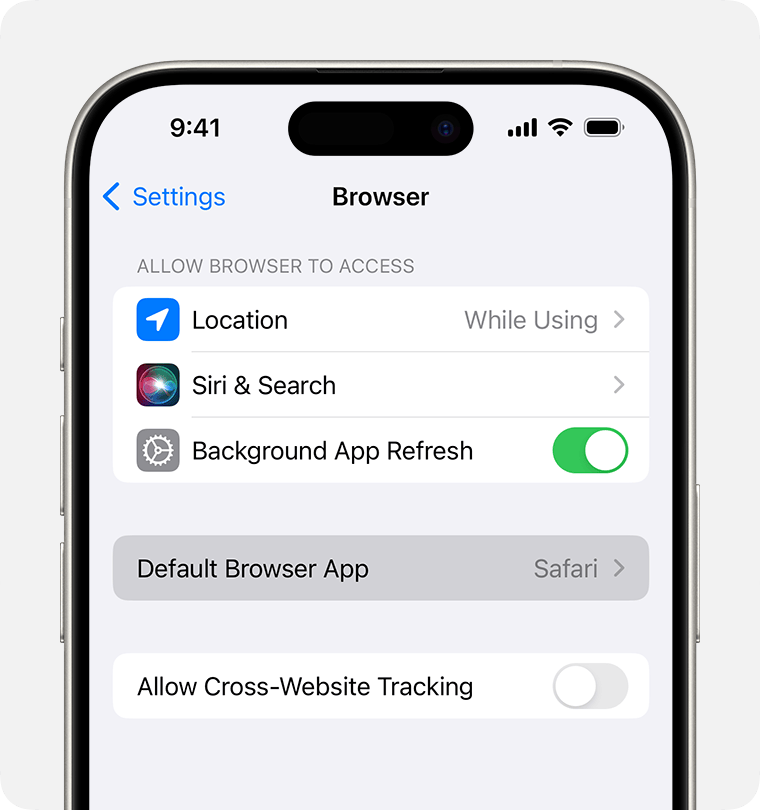
Select a web browser or email app to set it as the default. A checkmark appears to confirm it's the default.
If you don't see the option to set a web browser or email app as your default, the developer might not support it. Contact the app developer to learn more .
If you delete your default web browser app, your device will set Safari as the default browser app.
In countries or regions of the European Union on iOS 17.4 or later: after you choose a default browser from the web browser choice screen, if you want to change that setting, follow the steps to change your default browser .
If you delete your default email app, your device will set the Mail app as the default. If you delete the Mail app, your device will set one of your other email apps as the default. To use the Mail app again, you'll need to re-install it on your device.

Related topics
Explore Apple Support Community
Find what’s been asked and answered by Apple customers.
Contact Apple Support
Need more help? Save time by starting your support request online and we'll connect you to an expert.
Search results for
Affiliate links on Android Authority may earn us a commission. Learn more.
Safari vs Chrome: Which browser should you use on your Mac?
Published on May 31, 2022
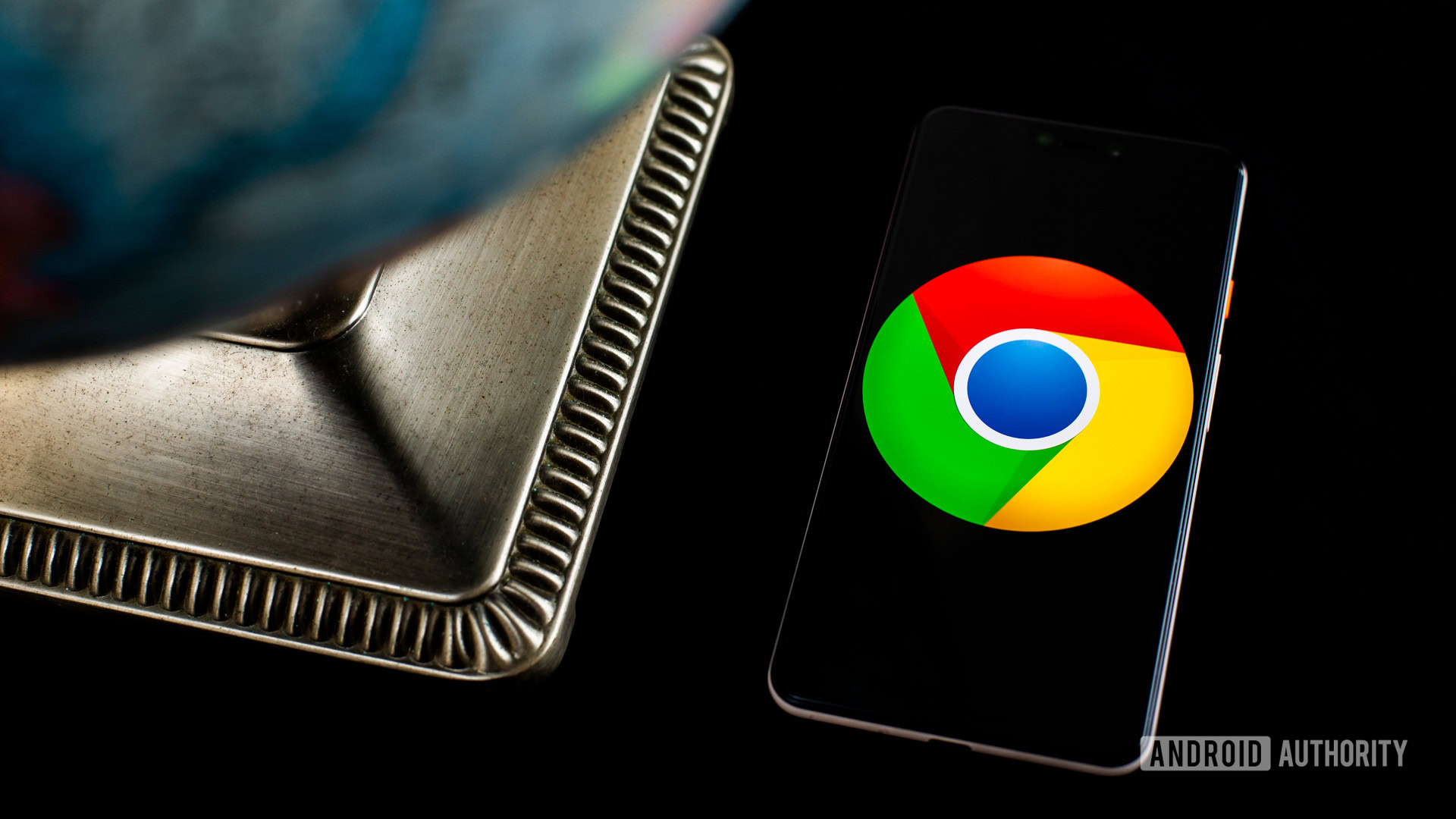
Apple’s Mac computers and its Safari browser have gone hand in hand for years now. It’s a solid app, perfectly tuned for macOS, but what if you want something different? If you have an Android phone, you might be drawn to the dark side of Chrome instead. Let’s stack Safari vs Chrome in the ultimate browser battle and see which is better for your needs.
See also: These Chrome Flags will improve your web-browsing experience
We’ll walk through most of the key features of each browser. After all, you may spend hours working in a browser every day, so you want to pick the best one. Ready to crown a winner? Let’s get started.
Is appearance everything?

We’re not here to argue which browser looks better, but careful design can go a long way. In many ways, this battle comes down to Apple vs Google. You might immediately lean one way or the other based purely on appearances.
Take tab organization, for example. In Safari, you’ll find a grid layout that makes it easy to find any tab in seconds on a desktop. However, Safari turns its tabs into a deck of cards on mobile, requiring you to swipe through an endless list. You can only see the top of each tab, which can be confusing if you have multiple tabs open from one site.
Over on Chrome, you’ll become good friends with the tab bar in a hurry. You can keep adding tabs as much as you want, and they’ll shrink to accommodate new windows. It’s not a bad setup until you can’t read your tabs. Eventually, they’ll be a website logo and an exit button, and you’ll have to cycle through each one.
Chrome can’t seem to make up its mind when it comes to mobile tabs. It’s gone through a few grid layouts, and you can now open new tabs inside tab groups. The idea is to bundle related tabs together, but it’s mostly an easy way to get lost.
How do the Safari and Chrome features stack up?
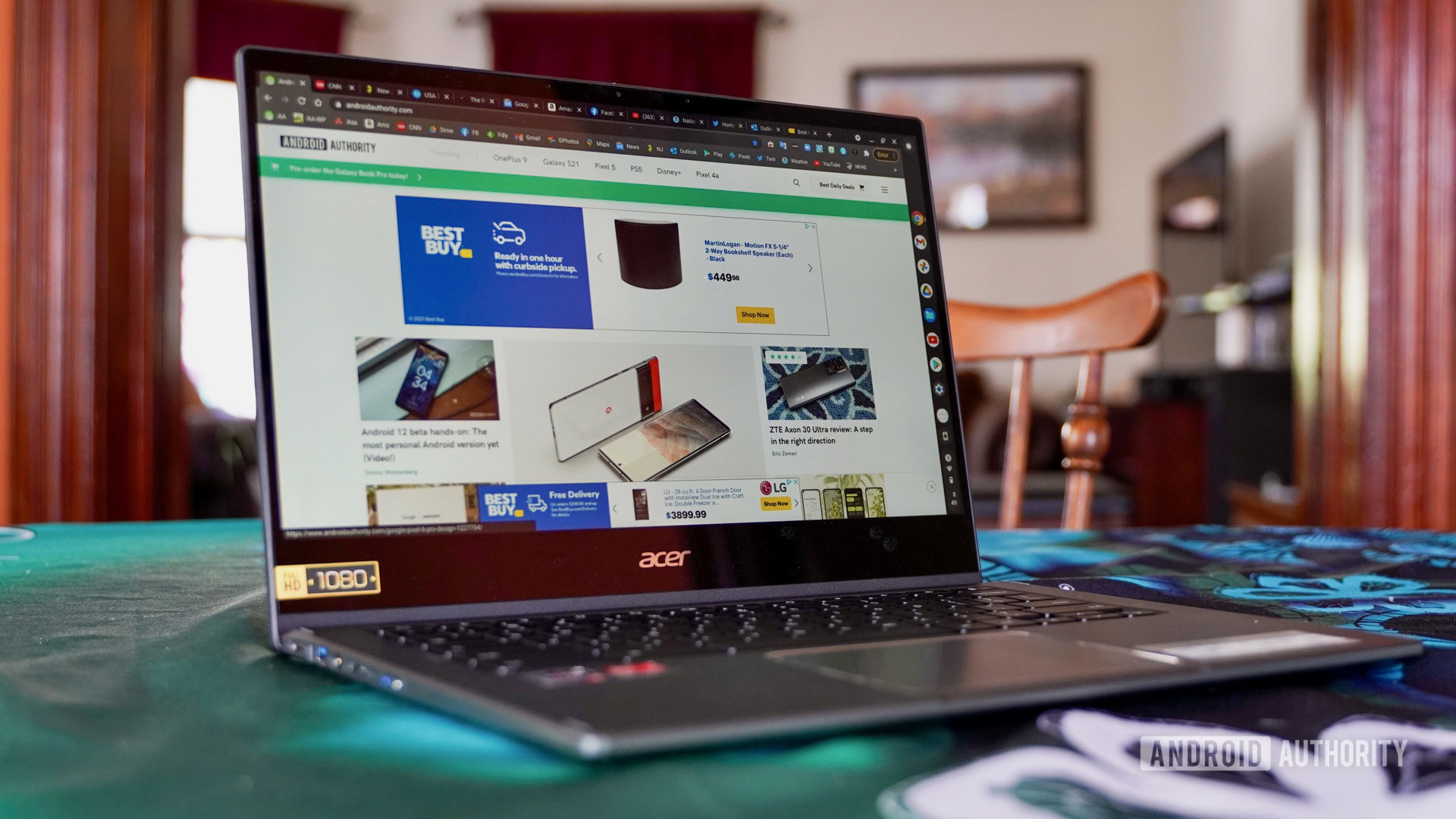
As you might expect, Chrome is the way to go if you’re part of Google’s ecosystem. If you have a Chromecast or some Google Nest devices, getting the most out of them will be far easier. You can right-click just about anywhere in Chrome and look for the Cast option any time you want to put your content on TV, too.
Chrome even comes with Google Translate built right in, so you can translate foreign web pages in seconds. There are thousands of other extensions you can explore as well, and Chrome even has a task manager on board in case you have to halt hefty processes.
See also: The best privacy web browsers for Android
Safari, however, is the king of continuity. If you have an iPad, iPhone , or a Mac, you can easily pass windows and tabs between them. It’s an easy way to take an article with you if you didn’t have time to read it all. Furthermore, you can use your other Apple security measures to verify purchases. Once you check out on Safari, you’ll be prompted for Touch ID or Face ID to protect your purchase.
Unfortunately, it took Apple until Safari 14 to finally introduce extensions. You can now add Grammarly and select password managers to your browser, which brings Safari more in line with features that Chrome has had for a while.
Also, Safari is still unavailable outside of the Apple realm. It’s really only your best bet if you’re all-in on iOS and macOS. If you have a Windows PC or an Android phone, you’ll have to look at Firefox or Chrome for access across all of your devices. It’s not exactly easy to battle Safari vs Chrome when you can only download one of the browsers on half of your devices.
What security and privacy measures are there?
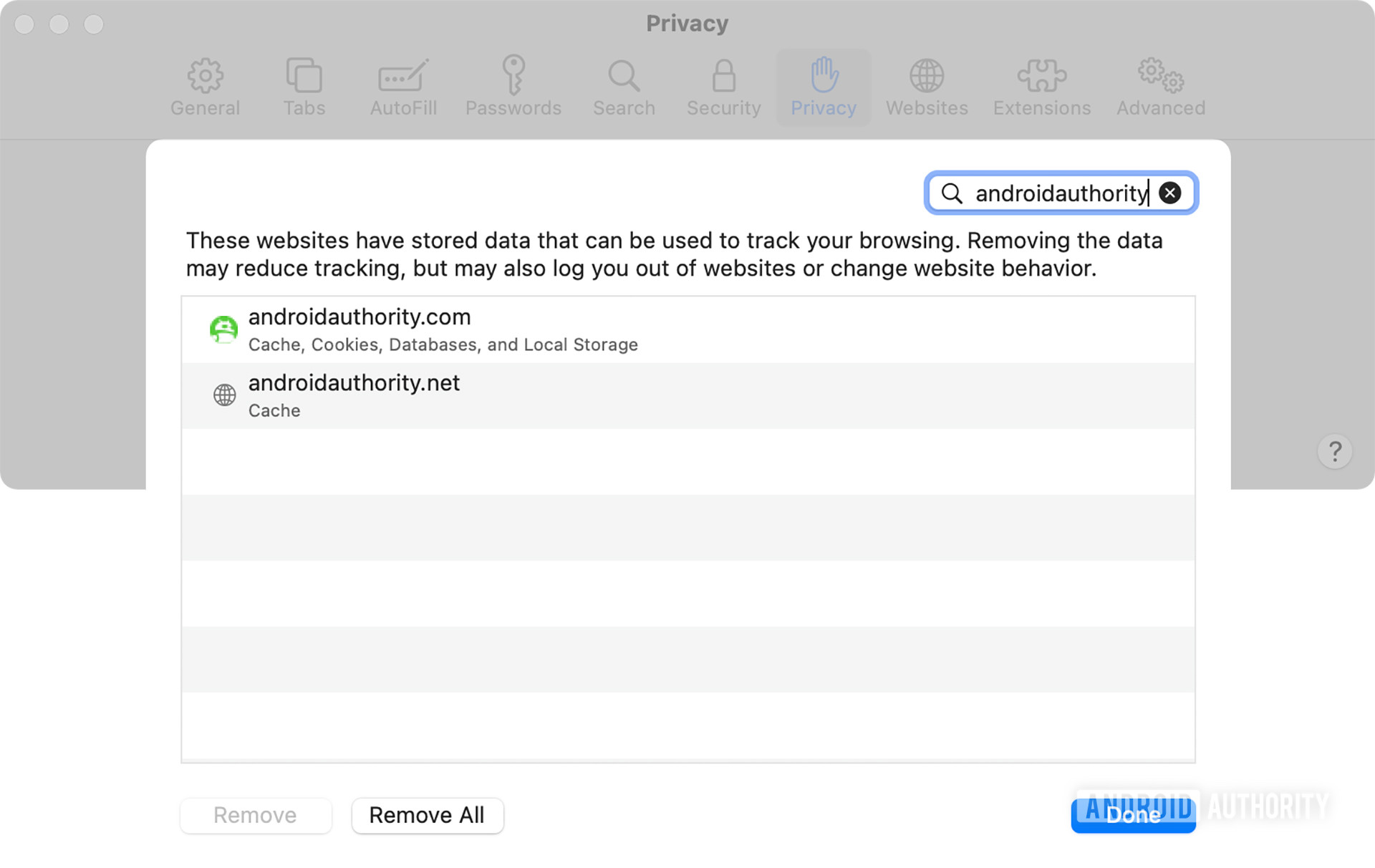
Feeling safe online is an important part of any browser, and it’s a key part of Safari vs Chrome. Both browsers make use of Google’s Safe Browsing database to guard against phishing schemes and other malware. It’s a great way to know that someone is looking out for you while you go about your day, even if you end up sending a lot of data straight to Google.
However, the biggest difference between the browsers comes in update frequency. Updates are an important way to stay ahead of cybercriminals, and Google Chrome has the easy advantage. Safari updates are often tied to macOS changes, but Chrome can push changes whenever it needs to. In fact, you’ll probably get some form of a patch just about every two weeks.
Both browsers block popups by default , but Chrome goes a step further to point out when you venture to an unsafe site. It displays a Not secure warning as well as a small popup window. Safari, on the other hand, indicates safety with a small green lock icon.
While we’re happy to give Google points for security, privacy is another matter entirely. The Mountain View-based company isn’t shy about wanting all of the data it can get its hands on, though it usually explains things away by trying to improve your experience. Common features like website recommendations and predictive search have to come from somewhere, don’t they?
Apple also collects all sorts of information on Safari, including names, locations, and IP addresses. It can share this information as needed, even if it claims not to share encrypted devices with authorities.
See also: How to clear your browser or system cache on a Mac
Is one browser easier to use?
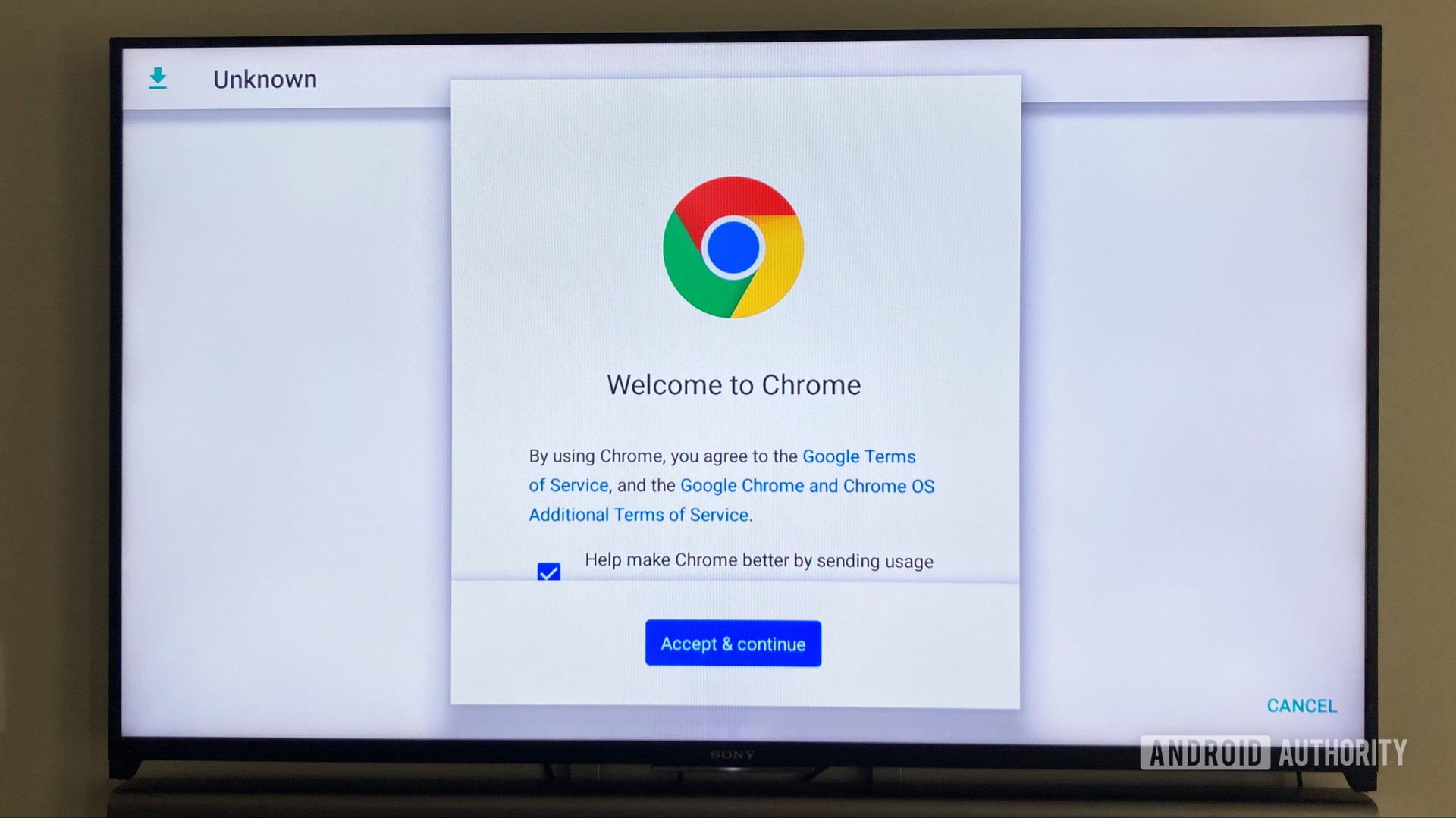
Ease of use in Safari vs Chrome is a fairly subjective point, and it probably depends on your other devices. You’re probably used to Safari if you’re coming from an iPhone, while Android users are probably more comfortable in Chrome. You’ll have to consider which tab setup is easier for your own use, but it’s not hard to adjust between the two.
One of the biggest drawbacks to Safari is that you can’t tinker with settings in the app. You’ll have to head over to Apple’s dedicated settings app if you want to change something. Chrome’s settings — like most browsers — are right in the app, which makes life easy if you want to change on the fly.
Safari vs Chrome: Which browser wins?
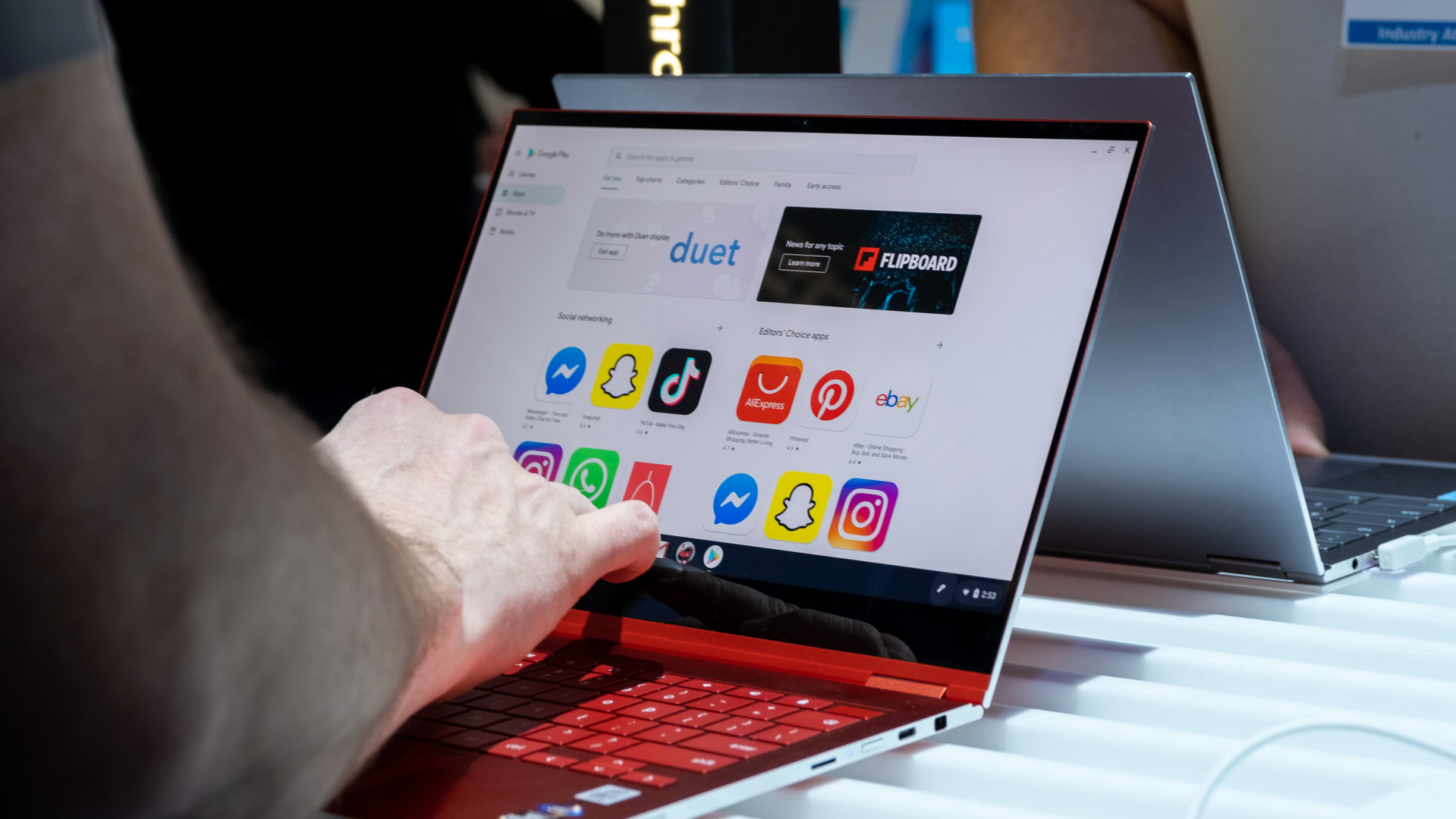
We’ve hinted at it here and there, but the winner of Safari vs Chrome comes down to your needs. If you live completely inside Apple’s ecosystem, you’ll be better off with Safari. The Handoff feature is tough to top, and it’s nice to have some extra security around your purchases. However, you’ll probably want to fire up Chrome if you have other Android or Windows devices in your house. It’s the only way you can still share tabs and login information between devices.
Although we’ve gone pretty deep into Safari vs Chrome, they’re not your only options. If you haven’t been swayed one way or the other, then it might be time to switch things up. There are tons of other browsers to consider, and we’ll touch on a few favorites.
See also: The best Android browsers for surfing whatever website you want
Are there any good alternatives?
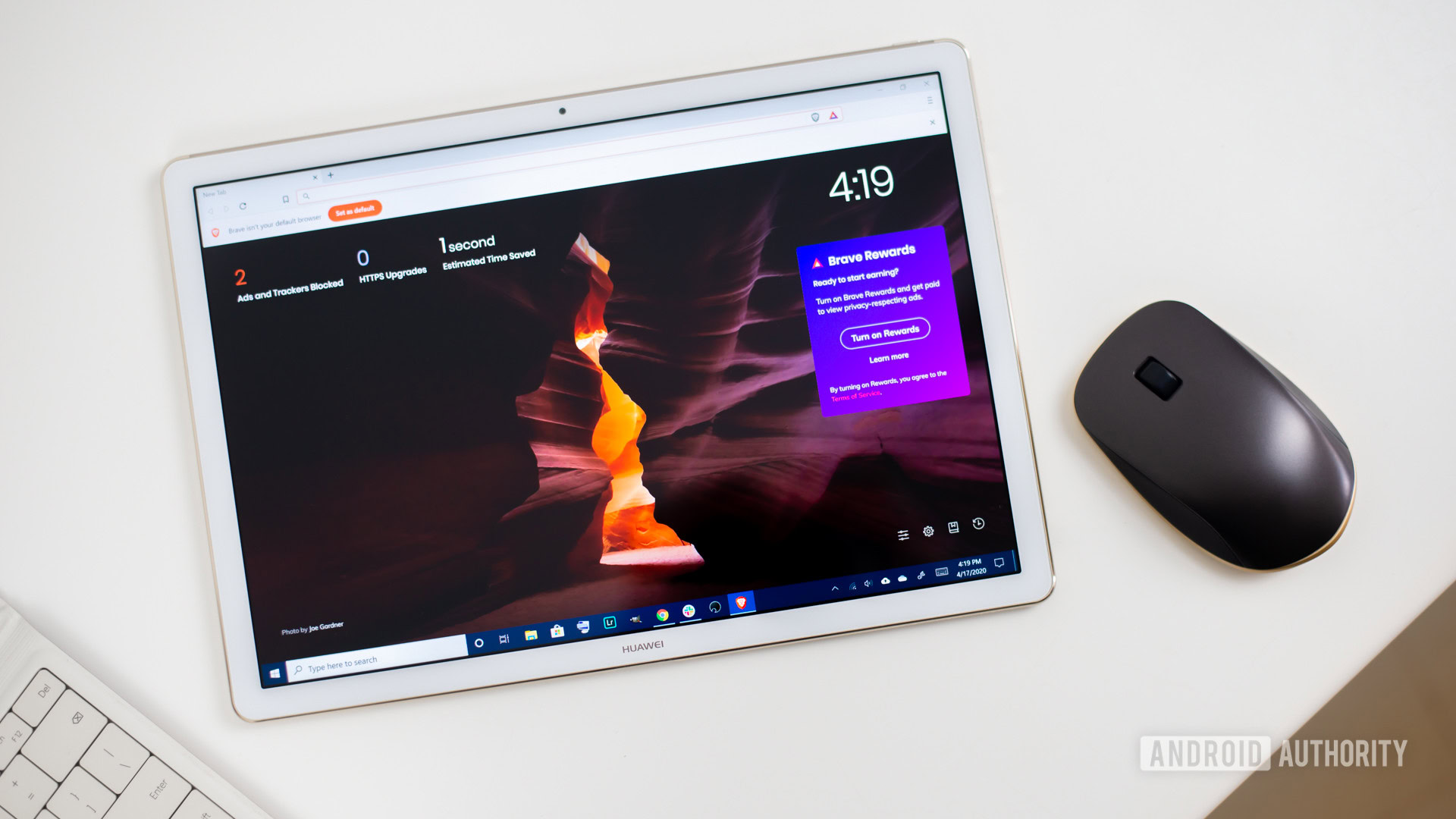
Brave Browser
One of the newer browsers, Brave Browser , launched in 2016 with plenty of features. It packs a built-in ad blocker and features HTTPS just about everywhere you look. Brave offers per-site settings adjustments, and you can even track what you’re blocking. Perhaps best of all is the fact that Brave Browser is free.
See also: Should you switch to Brave Web Browser?
Opera is another good browser alternative, and its messaging feature helps to clean up your overall experience. You won’t have to jump between apps, just open a small message window and keep chats going while you go about your day. Opera also has a built-in ad blocker to keep things smooth and an included VPN if you’re hoping to enjoy geo-restricted content.
If you’re worried about privacy, DuckDuckGo is a good option. Like Brave, it relies heavily on HTTPS and offers a private search mode. It even goes so far as to give each website you visit a privacy rating from A through F. You can’t sync all of your passwords, but the close button wipes your browsing data which is a nice bonus.
You might like
Google Chrome vs. Safari: Which Is the Most Secure macOS Browser?
Whether you've got a Mac or MacBook, you need to know which is the better browse to use. Safari vs. Chrome: which is the best for you?
Safari and Google Chrome are two of the most popular browsers today. But if you're using macOS, does one browser outweigh the other in terms of safety? Which of these two world-renowned browsers is more secure for macOS?
Google Chrome vs. Safari: Background
Safari and Google Chrome were developed and launched by two tech giants: Apple Inc. and Google, respectively. Both browsers were launched in the 2000s, though Safari came five years before Chrome, in 2003. Apple's incredibly popular smartphones, tablets, and laptops have popularized the use of Safari, which is a favorite for many who own iOS-based devices.
Google, on the other hand, was already a widely used search engine 10 years before the launch of the Chrome browser. So Chrome gained a lot of notoriety from its recognizable name.
Today, Safari and Google Chrome have billions of users around the world, but there is an evident gap in the popularity of the two. While Safari has around a billion users worldwide (as reported by Apple Insider ), Chrome has over 2.65 billion (according to BackLinko ). The latter certainly takes the cake in terms of worldwide usage, but this doesn't necessarily mean it's a better fit for macOS devices.
Google Chrome vs. Safari: Accessibility
While Google Chrome is a cross-platform browser that can be used on an array of operating systems, Safari is designed solely for Apple devices, which run on iOS and macOS. You can download and use Chrome on Linux-, Android-, Windows-, and macOS-based devices, making it far more accessible to users.
But there is a glaring flaw associated with cross-platform: it can be less secure. Cross-platform apps tend to be more exposed to security vulnerabilities than native apps, as the latter uses native security features designed specifically for a certain operating system.
On top of this, cross-platform apps can also be more limited in terms of features, as they cannot offer specialized options for a specific OS. You may find this to be a bit of an inconvenience if you use Chrome on macOS over Safari. But we'll discuss macOS suitability in more detail a little later.
Google Chrome vs. Safari: Security Features
When it comes to security, it's crucial that we take a look at the features offered by Chrome and Safari that can keep you safe.
What Security Features Does Safari Have?
Let's start with Safari.
Apple is known for offering users high-quality security measures, and Safari is no exception to this rule. Safari offers some great security features, starting with its Intelligent Tracking Prevention. Introduced in 2017, this feature blocks cross-site tracking via machine learning without affecting the way in which the sites you visit operate.
Safari also offers fingerprinting protection, which prevents third parties from developing a profile based on your activity. What's more, Safari's sandboxing feature stops third-party apps from making any unauthorized changes on your device.
Additionally, Safari's Incognito Mode allows users to surf the web without having their activity saved. In other words, you can browse online without having your search history saved if you activate this feature. This is great for privacy, though it's worth noting that this is not the same as a VPN.
In fact, Safari does not offer any kind of built-in VPN, which may be a deal-breaker for those who want to stay anonymous online. Of course, you can download a separate VPN service to use when browsing with Safari, but there are browsers out there that offer a built-in VPN for convenience.
What Security Features Does Google Chrome Offer?
So, what about Google Chrome?
Like Safari, Chrome also has a sandboxing feature, but things don't stop there. Chrome also provides users with advanced phishing and malware protection. This keeps you safe against suspicious attachments, links, and external images. You'll also be protected against spoofing with this feature, and be warned of unauthenticated email addresses so that you know when you may be dealing with a suspicious sender.
You can also make use of Chrome's HTTPS First Mode, which warns you if a given HTTPS address is suspicious or known to be dangerous. This feature can be invaluable in protecting you from malicious sites designed to steal your data.
Google Chrome vs. Safari: macOS Suitability
Because Safari is specifically designed for macOS and iOS devices, one would assume that it's better suited to macOS than Google Chrome. And, if this is what you've guessed, you'd be right! Safari is a better fit for macOS overall for a number of reasons.
Firstly, Safari can operate more efficiently on macOS than Chrome, meaning it doesn't drain your device's battery as quickly. This is particularly important if you're using your device on the go without access to a charging point.
What's more, if you're using a macOS version that's earlier than El Capitan , you won't even be able to download Google Chrome, whereas Safari is available for all versions.
As we already know, Safari is tailored to macOS. But Google Chrome is also somewhat tailored to ChromeOS, an operating system launched in 2011 used by Chromebook laptops. So, if you're using a Mac or MacBook, which are both powered by macOS, you ideally want a browser that's designed for your device. In this case, it's Safari.
Google Chrome vs. Safari: Hacks and Vulnerabilities
Chrome and Safari are both software applications, meaning they're built on code that may contain flaws. These flaws can give way to security vulnerabilities, which cybercriminals are always eager to exploit. But are these two browsers particularly prone to security issues?
Let's begin with Google Chrome. This browser has fallen victim to various attacks and exploits over the years, often due to security vulnerabilities. However, Google's security team is often quick to patch such vulnerabilities once they're discovered and keeps users updated on attacks and possible risks.
Safari, on the other hand, has never been hacked as a whole. This obviously bodes well for this browser's security integrity, but it's worth noting that security vulnerabilities are still a problem for Apple's software, as is the case with many software providers. Safari works to patch its vulnerabilities quickly, but they do still occur. Cybercriminals have also exploited Safari-based vulnerabilities in the past, so the risk of attacks evidently exists on both browsers.
Google Chrome vs. Safari: The Verdict
Overall, Safari is likely the better fit for macOS. This browser offers a range of useful security features and a number of perks over Chrome due to its streamlined suitability for macOS devices.
But if you're not a fan of Safari, you can still rely on Chrome on your macOS devices for useful features and adequate protection. Just make sure you activate all the relevant security options on both browsers to keep yourself as safe as possible.
Chrome and Safari Are Great Browsers, but One Comes Out on Top
If you're using a macOS device, you're likely better off using Safari, which is molded to fit your specific operating system. While Google Chrome is by no means a shoddy browser, it is not designed for Apple devices alone, and therefore misses out on certain specifications.
- Editorial Process
- Why Trust Us?
- Affiliate Linking Policy
- Privacy Policy
- Terms of Service
Weekly Must-Reads View All
7 things to do if you spilled water on your macbook.
Quick steps to save your MacBook from water damage
How to Boot Your Mac Into Verbose Mode: 4 Best Ways
Boot your Mac into Verbose Mode with this step-by-step guide
How to Fix Your Mac Shutting Down Randomly: 16 Fixes to Try
Troubleshoot random shutdowns on Mac with effective solutions
How Much Space Does macOS Take On Your Mac?
Understand macOS size and analyze your Mac's storage usage
Popular Topics
- What to Do With Your Old MacBook? 13 Useful Ways to Reuse an Old Mac
- What Is the MacBook Flexgate Issue and How to Fix It
- What Is the MacBook Flexgate Issue
- Uninstall Java
- Safely Transfer Files from Mac to Mac
- Safari Bookmarks Disappeared on Mac: 10 Best Ways to Restore Them
- Repairing disk permissions
- Old MacBook
Trending Now View All

Safari vs. Chrome on Mac: Which Browser Is Better?
Hashir Ibrahim
Reviewed by
Last updated: September 26, 2023
Expert verified
Safari is optimized for Mac, ensuring fast browsing, lower resource usage, strong privacy features, and seamless integration with the Apple ecosystem. However, it has limited extensions and infrequent updates.
Chrome stands out with its extensive customization options, extensions, and high-speed performance, but it can be resource-intensive and consume more battery.
- Safari is energy efficient, focuses on privacy, and integrates seamlessly with Apple devices: ideal for users prioritizing battery life and data protection.
- Chrome offers versatility with its wide range of extensions, customizable features, and slightly faster speed: suitable for users seeking personalization and performance.
- Both browsers have robust security features, but Safari emphasizes privacy, while Chrome offers customizable security extensions and frequent updates.
- So, Safari is a better choice for light internet browsing in Safari vs. Chrome on Mac, while Chrome excels at running heavy web applications.
Ever wondered which browser is the coolest for surfing the web on your Mac? Is it Safari or Chrome? Chrome is like a Swiss Army knife – super handy and flexible, while Safari is the speedy hometown hero, saving the day by being fast and keeping your secrets safe.
In this Safari vs. Chrome on Mac guide, I’ll compare these big shots and share the cool and not-so-cool stuff about them. By the end, you’ll know which browser is the winner for your Mac!
Google Chrome vs. Safari: A Quick Comparison

Before diving deep into the detailed exploration of Safari vs. Chrome on Mac, let’s glance at a quick comparison. This table highlights some key features and differences between the two browsers, giving you a snapshot of what each brings to the table.
Safari vs. Chrome: Pros & Cons
Here’s a quick rundown of the advantages and disadvantages of using Safari and Chrome on a Mac:
- Optimized for smooth and fast browsing on Mac
- Consumes less battery and system resources
- Strong privacy features and protections
- Seamless integration with the Apple ecosystem
- Enhanced multimedia support
- Infrequent updates can affect performance
- Limited cross-platform synchronization
- Limited availability of extensions
Google Chrome
- Regular updates ensure optimal performance
- Syncs seamlessly across multiple platforms
- Customizable privacy settings
- A wide array of extensions and customization
- Excels in running web applications
- Can be resource-intensive, affecting performance
- Tends to consume more battery life
- Privacy settings can be less robust than Safari
- Not as integrated with macOS as Safari
To sum up, the choice between Safari and Chrome largely depends on individual preferences, needs, and the specific use case.
If you’re someone like me who uses a lot of extensions only available on Chrome, you’ll have to stick with it. And if you’re just using a web browser for light internet browsing, then Safari seems to be a better choice in general.
Safari vs. Chrome on Mac: A Detailed Comparison

Both Chrome and Safari bring their unique strengths to the table. In this section, I’ll offer a detailed comparison of Safari vs. Chrome on Mac, diving into their features, performance, user experience, and more.
1. User Interface

When it comes to user interface, Safari is known for its simplicity and seamless integration with Apple devices. It’s easy on the eyes, and everything feels clean and organized.
Then there’s Chrome, packed with all sorts of goodies – you can open a bunch of tabs, switch between different user profiles, and even decorate it with cool themes.
But while Chrome is full of tasty bits, it can sometimes feel a bit too much. On the other hand, Safari keeps it sweet and simple, ensuring nothing gets in the way of your web adventures.
Verdict : If you’re all about keeping things neat and tidy, Safari is your go-to. But if you’re looking for a browser that’s as unique as you are, with all the bells and whistles, pick Chrome.
2. Features

Safari is like home for anyone using Apple gadgets. It’s super smooth, lets you open tabs across your Apple devices with iCloud, and even has a special Reader mode for a peaceful reading time, away from annoying ads. You can also use Touch ID and Face ID to confirm purchases on Safari.
But here comes Chrome, the adaptable browser that works well with different operating systems, whether you’re Team Android, Windows, or Apple. Chrome works really well with Chromecast and Google apps, like Google Translate, making it a handy buddy for all sorts of tasks.
Now, here’s where Safari really lags in terms of features – extensions. Chrome offers over 175,000 fun extensions, way more than Safari’s 350. Plus, you can make it look just the way you want with cool themes and backgrounds.
Verdict : So, who wins the feature face-off? It’s Chrome! With its endless features and the ability to make it truly yours, Chrome is your best bet for a fun and personalized surfing ride.
3. Speed and Performance

Safari is known for being light on its feet, using less RAM than Chrome. This means it can juggle more tasks at once, like opening many tabs and running heavy websites. Plus, for gaming enthusiasts, Safari promises a smoother ride through the high-res gaming world.
Chrome, on the other hand, is like a techy sprinter with gadgets up its sleeve. It’s tab isolation keeps each tab in check, so if one tab is acting up, it won’t trip the whole browser. And, if Chrome senses a tab is just lazing around, it’ll put it on pause to save energy.
But, with all its gadgets, Chrome can sometimes feel heavy, munching more battery and making other apps slow.
Now, let’s talk speed!
Benchmark Test Results
When browsing the web, speed is key. I put Safari and Chrome to the test to see how they perform in terms of speed and overall performance, focusing on these factors:
- How they handle lots of use
- How they deal with websites full of graphics
For my test, I used three tools: JetStream 2, MotionMark, and Speedometer, running them on a MacBook Air with 8GB of RAM and an Apple M1 processor.
Here are the results:
Several experts have posted the results of the Speedometer 2.0 test for JS/web performance on the MacBook Pro M1 Max on Twitter . The device scored 277 in this test, nearly doubling the speed of the fastest desktop iMac and marking a 20% improvement over the standard M1 MacBook.
- Javascript (JetStream) : Chrome slightly outperforms Safari, but the difference is marginal.
- Graphics (MotionMark) : Safari leads, indicating a smoother user experience for graphically intensive applications.
- Responsiveness (Speedometer) : Chrome significantly outshines Safari, making it a better choice for tasks requiring quick interactions.
Verdict : So, while Safari excels in graphics performance, Chrome has the upper hand in Javascript processing and responsiveness, making it a versatile choice for varied web tasks on a MacBook Air with an Apple M1 processor.
4. Privacy and Security

Safari is all about keeping your data safe and your browsing private. It protects you from unwanted trackers and offers a smooth ride, especially if you’re using Apple gadgets.
On the other hand, Chrome is armed with customizable security features and speedy performance. It’s always looking for online threats, but its knack for collecting data might make some users think twice.
Despite excellent security features, Chrome’s popularity makes it a target for hackers, and its password manager is confined to the browser on Apple devices. Its unclear privacy policy and dependence on advertising might raise concerns about data misuse.
Verdict : It’s a draw! Chrome leads with customizable security, while Safari excels in password management. Apple users may favor Safari for its iCloud integration, but Chrome is a strong contender for more security control.
5. Extensions

Picking between Safari and Chrome is all about what extras you like! Chrome has a huge selection, with over 175,000 extensions. So, if you want to block ads, check your grammar, or change up your themes, Chrome’s got your back.
Safari plays it cool with fewer but top-notch extensions. It’s not about quantity but quality, right? Plus, Safari lets you use extensions on your iPhone and iPad, something Chrome hasn’t mastered yet.
But here’s the twist! More extensions in Chrome can mean slower loading times on some websites. And while Safari keeps it simple and secure, Chrome offers customization for those who love tinkering around.
Verdict : So, Chrome is the clear winner of the extension war! Its vast array of options makes it the go-to for those craving variety. But Safari would do if you’re an Apple fan looking for quality and mobile-friendly extensions.
Should I Use Safari or Chrome on Mac?
If you prioritize privacy and seamless integration with Apple devices, Safari is the way to go on Mac. However, if you value extensive customization, a wide range of extensions, and high-speed performance, Chrome is your best bet.
Choosing the best browser ultimately hinges on your specific needs and preferences. Here are a few more tips for you:
- If you have a slow internet connection on your Mac , it can interfere with your browser’s performance.
- If Safari is crashing on your Mac , disable unnecessary browser extensions , clear Safari cache , and delete Safari history to prevent random crashes.
- You can improve your browser’s performance by regularly clearing the browser cache on your Mac .
Frequently Asked Questions
Is safari better than chrome.
Safari and Chrome both have their strengths. Safari is known for being more energy-efficient and privacy-focused, making it a great choice for Apple users. Chrome, however, offers a vast array of extensions and is slightly faster, making it versatile for those who prioritize customization and speed.
Does Safari use less battery than Chrome?
Yes, Safari is known for using less battery than Chrome. It’s optimized for energy efficiency, especially on Apple devices, making it a preferred choice for users looking to maximize battery life. Chrome, while feature-rich, tends to consume more power, which can lead to faster battery drain.
Is Safari safer than Google Chrome?
Safari and Google Chrome offer robust security features but excel in different areas. Safari is known for its strong privacy protections, especially for Apple users, while Chrome offers frequent updates and a vast array of customizable security extensions.
I'm Hashir, a tech journalist with a decade of experience. My work has been featured in some of the top tech publications like MakeUseOf and MakeTechEasier. I have a bachelor's degree in IT, a master's in cybersecurity, and extensive knowledge of Apple hardware, specifically MacBooks. As the senior writer at MacBook Journal, I write in depth guides that help you solve any issues you have with your mac and unbiased reviews that help you make the right buying decisions.
Hi there! I'm Ojash, a tech journalist with over a decade of experience in the industry. I've had the privilege of contributing to some of the world's largest tech publications, making my mark as a respected Mac expert. My passion lies in exploring, using, and writing about MacBooks, and I enjoy sharing my expertise to help others make informed decisions and get the most out of their MacBook experience. Join me as we delve into the fascinating world of MacBooks together!
You May Also Like

Best Call of Duty Games on Mac: How to Play
Written by Hashir Ibrahim Reviewed by Ojash Last updated: September 22, 2023

Apple’s Public vs. Developer Beta: What’s the Difference?
Written by Hashir Ibrahim Reviewed by Ojash Last updated: September 26, 2023

Best RPG Games for Mac: Insights From a Hardcore Gamer

FonePaw Data Recovery Review for Mac: Is It Worth It?
The Little Known Safari Feature Even Google Chrome Can't Do On iPhone
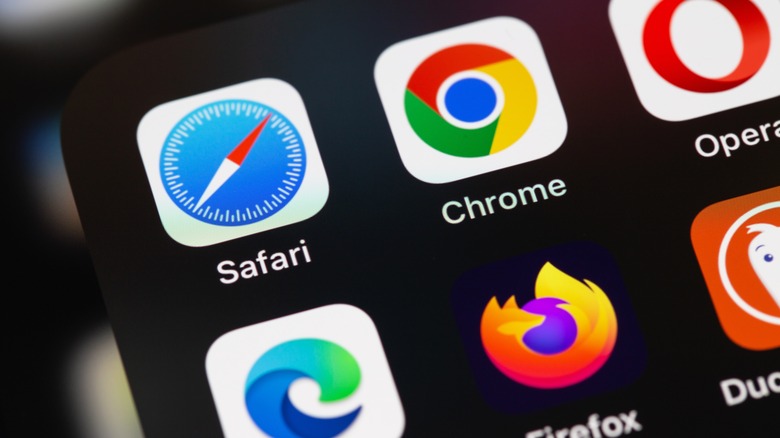
With every new version of iOS comes a slew of useful upgrades that could change the way you do certain tasks on your iPhone. Most of these updates improve upon the functionality of Apple's slate of built-in apps. In the case of Safari, thanks to the latest version of iOS 17, iPhone's mobile browser now lets you create multiple profiles to keep work-related searches separate from your personal ones. It's also more responsive and does a better job of providing more applicable suggestions that match your original query.
Of the many useful and game-changing Safari features you can take advantage of on your iPhone, one was actually first introduced with iOS 15: the ability to create tab groups. On a computer, this feature is incredibly essential for those who use web browsers regularly and need to organize and consolidate the many pages they have open. Not many mobile browsers offer this functionality. Based on testing, tabs can't be added to groups through Google Chrome on iOS.
If you own an iPhone and happen to have a different default web browser assigned, find out why it may be worth reverting to Safari and make using tab groups one of your mobile browsing habits.
How tab groups work in Safari on iPhone
If you're the sort of person who likes to click on links and read them on Safari, a "tab group" is essentially a feature that lets you compile several webpages currently open on your mobile browser app into collections. Although you can technically add any page to any tab group, the function is more useful as a method for organizing all the links you have yet to read into similar, smaller, more manageable sets and allows you to find the page you need more easily. For instance, you can add recipe pages to a Food tab group, news articles to a Current Events tab group, and Reddit threads to a Random Learning tab group. You get the idea.
To add an open Safari web page to a new tab group using your iPhone:
- Launch the Safari app.
- Tap the Tabs view switcher. It's the two-square icon in the bottom navigation bar.
- Long-press on one of the page tiles you'd like to add to a tab group.
- Select Move to Tab Group.
- Tap New Tab Group.
- Type in your desired name and hit Move.
Once you have several tab groups in place, you can easily switch between them by tapping the Tabs icon and swiping left or right on the tab group name carousel at the bottom of the screen. You can also hit the List icon between "+" and Done to see all the tab groups you created in one go.
Other things you can do to Safari tab groups on an iPhone
To rename a tab group, tap the Tabs icon and then hit the List icon between "+" and Done at the bottom of the screen. Then follow these steps:
- Tap the three-dot icon next to the tab group name you want to update.
- Select Rename.
- Enter a new name.
If you'd like to finetune the theme of your tab groups so that collated pages are more relevant to each other in terms of content, you can opt to move a tab from one group to another:
- Open the tab you'd like to relocate on Safari.
- Long-press on the Tabs icon.
- Pick a group you've already created, or create a new one entirely.
You can also improve organization within tab groups by reordering them according to your preferences:
- Tap the Tabs icon.
- Swipe on the tab group names at the bottom of the screen till you get to the one you want to rearrange.
- Long-press on any tab in the group and drag it to your preferred spot.
- Alternatively, you can long-press on any tab in the group, select Arrange Tabs By from the menu, and pick one of the sorting options.
Finally, you can pin an open tab to prioritize it from other links in the collection:
- Select the tab group you want from the bottom navigation bar.
- Long-press on the tab you want to pin.
- Select Pin Tab from the menu.
This will minimize the tab to a smaller size, but it will always stay at the top of the tab group it belongs to, so it's the first thing you see when you view the collection.
Newsroom Update
Apple is introducing a new Apple Watch Pride Edition Braided Solo Loop, matching watch face, and dynamic iOS and iPadOS wallpapers as a way to champion global movements to protect and advance equality for LGBTQ+ communities. Learn more >
Looks like no one’s replied in a while. To start the conversation again, simply ask a new question.
Should I use safari or chrome or edge
Sh should I use Safari or Edge or chrome for surfing the Internet I have an iPhone 13 mini
iPhone 13 mini, iOS 16
Posted on Feb 26, 2023 12:48 PM
Posted on Feb 26, 2023 11:00 PM
It's your choice. Safari is built into iOS and works across your devices, and Safari also supports extensions that can be downloaded from the App Store. I use Safari, and can definitely recommend that browser.
Similar questions
- Where is an internet browser on my new iPhone mini Where is the internet browser , eg, Chrome or Safari, , on my new iPhone mini 148 1
- Surfing the web Hello, I’d like to ask if Safari, on the iPhone, does it have a safari browser like Google search? 52 1
- Unposibility using safari with mobile Internet Hello! Why I can't use safari using mobile Internet? 107 1
Loading page content
Page content loaded
Feb 26, 2023 11:00 PM in response to cure13lullabye
How to view and clear your web browsing history in Safari on iPhone or iPad
Manage your history for greater privacy
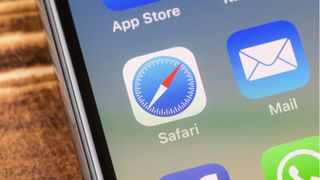
Tools and requirements
- Quick steps
- Step-by-step guide
Final thoughts
Knowing how to view and clear your web browsing history in Safari on an iPhone or iPad is fundamental for privacy. After all, browsing history comes bundled with web navigation unless you're on Private browsing.
Safari is Apple ’s proprietary web browser, and it offers a simple method to review and delete specific websites from your web history, or all of it. In this guide, we'll walk you through the steps to access and clear your Safari browsing history on iPhone and iPad.
Additionally, for an incredibly secure browsing experience on iPad, we recommend checking out the best iPad VPN .
- An iPhone or iPad
Steps for how to view and clear your web browsing history in Safari on iPhone or iPad
- Launch Safari.
- On an iPhone, tap the Book icon at the bottom. On an iPad, tap the 'Show Sidebar' button at the top left.
- Select the History tab (Clock icon).
- Tap 'Clear' and select the timeframe.
- Tap 'Clear History'.
Step-by-step guide to view and clear your web browsing history in Safari on iPhone or iPad
We’ve demonstrated the steps below on an iPhone. But the process is nearly the same on the iPad, and we’ve pointed out the differences where relevant.
1. Launch Safari and access History
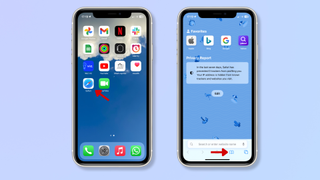
Open Safari on your iPhone and tap the 'Bookmarks' button at the bottom (beside the tab switcher button).
On iPad, tap the 'Show Sidebar' button at the top left corner.
2. Clear History
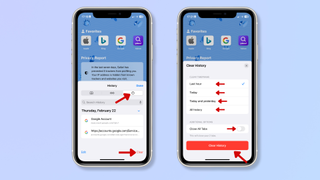
Select the History tab (clock icon) to view all your browsing history.
Tap 'Clear' at the bottom right corner to bring up the menu and choose a duration under the 'Clear Timeframe : Last hour , Today , Today and yesterday' , and 'All history' .
To close tabs along with clearing history, toggle on 'Close All Tabs' .
Finally, tap 'Clear History' at the bottom to erase your browsing history.
To delete only specific websites from history, go to the History tab , tap 'Edit' (in the bottom left corner), select the websites you wish to delete, and then tap 'Delete' (bottom right corner).
Clearing your web browsing history in Safari is a straightforward and effective way to boost privacy. But remember that deleting your history removes data that you could easily use to access previously visited websites. If you’d prefer not to save your browsing data, try the Private Browsing Mode on Safari.
For more iPad and iPhone tips, check out our tutorials on how to use and configure a VPN on your iPhone or iPad , how to change your iPhone password or reset it , and how to save, view and manage passwords in Safari .
Get daily insight, inspiration and deals in your inbox
Get the hottest deals available in your inbox plus news, reviews, opinion, analysis and more from the TechRadar team.
Nikshep Myle is a freelance writer covering tech, health, and wellbeing. He has written for popular tech blogs like Tom's Guide, GadgetReview, SlashGear, and Creative Bloq, and has extensively reviewed consumer gadgets. When he’s not writing, you’ll find him meditating, gaming, discovering new music, and indulging in adventurous and creative pursuits.
How to share passwords with friends in iOS 17
How to enable YouTube picture-in-picture on iPhone
iPad Air (2024) vs iPad Air (2022): the key differences
Most Popular
- 2 Microsoft launches generative AI model designed exclusively for US intelligence services — air-gapped system for spies aims to avoid potential security leaks
- 3 Memorial Day preview: save up to $1,000 on stunning OLED TVs at Best Buy
- 4 Forget projectors – TCL’s 115-inch mini-LED TV has 6.2.2-channel Dolby Atmos speakers and 5,000 nits brightness
- 5 Peacemaker season 2's new cast reveal means it's going to be harder to follow James Gunn's DC Cinematic Universe
- 2 VPNs aren't broken – TunnelVision attack is being sensationalized
- 3 Forget projectors – TCL’s 115-inch mini-LED TV has 6.2.2-channel Dolby Atmos speakers and 5,000 nits brightness
- 4 Capture amazing images every single day
- 5 Sennheiser has slashed prices on some of its best headphones for Click Frenzy

Google Chrome on iPhone and iPad could be about to borrow a popular Safari feature by adding multi-profile support in a future update
W hen Apple announced profile support was coming to Safari on iPhone and iPad as part of the iOS 17 update last year it was immediately well-received. The feature allows people to create a profile under which they can do specific types of browsing, like for work for example, and now it seems a similar feature is coming to Google's Chrome as well.
While Google is yet to confirm the feature it's reported that a basic profile-switching mechanism is currently being tested in Chrome for iPhone and iPad. It's notable that the same feature is not yet available on Android, suggesting that it could either debut on Apple's platforms first or a wider launch across all mobile platforms is in the cards.
It's still unclear what timescale Google is working to, and it's possible the plans could be nixed before launch. But fans of profiles in their web browser could be about to get a whole new option.
Keeping a low profile
As mentioned, Google has so far kept its multi-profile plans to itself but a MacObserver report suggests that those plans are very real.
"Google is currently working on a basic profile-switching mechanism for Chrome on iOS," MacObserver explains. "Once implemented, they will top it up with more advanced features. Thus, the item is aptly titled 'Implement rudimentary profile switching.' The report goes on to say that "Google is testing the UI, and it is currently behind an experimental flag. Even the name or title of the feature has yet to be decided."
That would suggest that any launch is unlikely to take place any time soon, so we wouldn't start holding your breath just yet. In the interim, Apple's Safari might be worth checking out. Maybe you've heard of it?
More from iMore
- How to set up Safari Profiles on iOS 17
- New Safari test build finally adds Profiles to Apple's web browser
- Every website can now be an app thanks to Safari — it's macOS Sonoma's secret weapon

More From Forbes
Ios 17.5—apple issues update now warning to all iphone users.
- Share to Facebook
- Share to Twitter
- Share to Linkedin
Apple has issued iOS 17.5 along with a warning to update your iPhone as soon as possible. That’s because iOS 17.5 fixes 15 security vulnerabilities, some of which are serious.
Apple remains tight-lipped about exactly what is fixed in iOS 17.5, to ensure as many people as possible are able to upgrade their iPhones before attackers can get hold of the details.
Among the important flaws patched in iOS 17.5 are an issue in the Kernel at the heart of the iPhone operating system tracked as CVE-2024-27818, which could allow an attacker to execute code. Another issue fixed in iOS 17.5, in AppleAVD, could see an adversary able to execute arbitrary code with Kernel privileges if a user downloads an app, Apple said on its support page .
Apple has issued iOS 17.5 along with a warning to update your iPhone as soon as possible.
05/14 update below. This article was first published on 05/13.
Another significant bug squashed in iOS 17.5 is a vulnerability in Voice Control that could allow an attacker to elevate privileges. Meanwhile, CVE-2024-27834 is a flaw in WebKit, the engine that underpins the Safari browser, which could allow an attacker to bypass Pointer Authentication.
An issue in MarketplaceKit tracked as CVE-2024-27852 and reported by researchers at security outfit Mysk could see a maliciously crafted webpage able to distribute a script that tracks users on other webpages.
Google Chrome Gets Third Emergency Update In A Week As Attacks Continue
Biden vs. trump 2024 election polls: biden losing support among key voting blocs, japanese fans are puzzled that yasuke is in assassin s creed shadows.
Sean Wright, head of application security at Featurespace, calls the fixes issued in iOS 17.5 “a mixed bag.”
The worst is the kernel flaw, he says. “This could be chained with some of the other vulnerabilities to allow an attacker to gain full access to the device.”
POC for iOS 17.5 Kernel Flaw Will Soon Be Ready
One day after iOS 17.5 was issued, more is being unveiled about the security fixes. Notably, a security researcher Meysam who claims to have reported the kernel vulnerability has described in a post on X, formally Twitter, how he reported the flaw in iOS 17.4.1—the previous version of iOS 17. He plans to publish a proof of concept to demonstrate how it works “soon.”
While he is keen to point out that this is not an exploit—ie a direct method of exploiting the issue—it does make updating to iOS 17.5 especially crucial. The more attackers know about the flaw, the more likely it is they can use it in attacks.
Apple Issues iOS 16.7.8 To Fix Already-Exploited Issue
Alongside iOS 17.5, Apple has issued iOS 16.7.8, fixing two issues, one of which is already being used in real-life attacks. Tracked as CVE-2024-23296, the flaw in RTKit could enable an attacker with arbitrary kernel read and write capability to bypass kernel memory protections. “Apple is aware of a report that this issue may have been exploited,” Apple wrote on its support page .
The iOS 16.7.8 is available for iPhone 8, iPhone 8 Plus, iPhone X, iPad 5th generation, iPad Pro 9.7-inch, and iPad Pro 12.9-inch 1st generation.
Why You Should Update Now To iOS 17.5 Or iOS 16.7.8
It’s been a while since Apple’s last security update, iOS 17.4.1 —released in March—which fixed multiple serious security flaws. The update before that, iOS 17.4, was an emergency patch for issues being used in real life attacks.
The iOS 16.7.8 update is similar as it also patches already-exploited security issues. If you have an older device, updating to iOS 16.7.8 is a no-brainer, given that the flaw is being used in attacks.
While iOS 17.5 doesn’t cover any already-exploited flaws—at least that we know about—some of the issues are serious making it important you update your iPhone as soon as you can.
At the same time, the iOS 17.5 update contains cool new features, including unwanted tracker protection, as well as bug fixes.
The iOS 17.5 update is available for the iPhone XS and later, iPad Pro 12.9-inch 2nd generation and later, iPad Pro 10.5-inch, iPad Pro 11-inch 1st generation and later, iPad Air 3rd generation and later, iPad 6th generation and later and iPad mini 5th generation and later.
Two days after iOS 17.5 was released, some users are complaining about a Photos bug that is seeing deleted photos from years ago reappearing on people’s iPhones. This bug is certainly concerning, but it’s likely it will be fixed soon by Apple. I haven’t had any issues since updating to iOS 17.5.
If you care about your security, you will need to apply iOS 17.5 or iOS 16.7.8 manually, because Apple’s automatic updates can take a while to reach iPhones. It’s during this time that your device remains open to attack.
Wright says there is no need to panic, but ensure that you update “as soon as you can.”
So what are you waiting for? Go to your iPhone’s Settings > General > Software Update and download and install iOS 17.5 or iOS 16.7.8 now.
05/14 update: As well as important security fixes, the iOS 17.5 update contains a feature that helps stop unwanted tracking across platforms. Building on Apple’s iPhone feature to detect AirTags that might have been slipped into a bag or placed in a vehicle, the unwanted tracking tool in iOS 17.5 is a result of a partnership between Apple and its rival Google.
After releasing iOS 17.5, Apple has issued a press release to confirm the anti-tracking features are live. It describes how Apple and Google worked together to create an industry specification—Detecting Unwanted Location Trackers—for Bluetooth tracking devices. “This will help mitigate the misuse of devices designed to help keep track of belongings,” the statement reads, adding that Apple is implementing this capability in iOS 17.5, and Google in its Android 6.0+ devices.
The iOS 17.5 feature means users will get an “[Item] Found Moving With You” alert if an unknown Bluetooth tracking device is detected.
It works across platforms, with Bluetooth tag manufacturers including Chipolo, eufy, Jio, Motorola and Pebblebee saying future tags will be compatible.
Among the benefits, it offers instructions and best practices for manufacturers, “should they choose to build unwanted tracking alert capabilities into their products,” according to Apple and Google.
The standard is ongoing: Apple and Google are working with the Internet Engineering Task Force via the Detecting Unwanted Location Trackers working group to develop the official standard.
Update 05/15: Article updated to include details about iOS 17.5 photos bug.

- Editorial Standards
- Reprints & Permissions
Join The Conversation
One Community. Many Voices. Create a free account to share your thoughts.

IMAGES
VIDEO
COMMENTS
Ultimately, Safari and Chrome are both solid browser choices. For iPhone, iPad and Mac users looking for simplicity and deep integration across the Apple ecosystem, Safari is a good choice — and ...
However, Safari is only limited to Apple devices. On the other hand, you may prefer Chrome if customization options, a wide range of extensions, and additional features are more important to you. Therefore, if you want to use Chrome on your Apple devices, you may change it on your iPhone and Mac. Ultimately, whatever you choose, both browsers ...
Chrome RAM: Pros. Tab isolation: Chrome uses a process isolation model, which means that each tab runs as a separate process. This can help prevent a single tab from using up too much memory and crashing the entire browser. Reduced memory leaks: Chrome's use of a "garbage collector" helps to prevent memory leaks and ensure that unused memory is released back to the system, improving the ...
Chrome maintains its longtime lead on this test with a score of 528. Edge, Opera, and other Chromium-based browsers hew closely to Chrome. Firefox and Safari bring up the rear, at 515 and 468 ...
Pros: Plenty of useful features; great for use with a Windows 10 PC. Cons: Requires Microsoft account to access full feature set; slightly blocky design. If you like Chrome but aren't keen on ...
After Safari, Chrome is the next most popular browser on iPhone and iPad. And it's the most popular browser on all other devices. This is for good reason: Chrome is fast, reliable, packed with features, and available on all platforms. Google lets you perform Voice and Incognito searches straight from the Add button.
Pros: Google Chrome for Mac Computer. Google Chrome has significantly more extensions than Safari; these can help improve privacy, save you money online shopping, and more. Google Chrome can run on all operating systems, while Safari is not an option for Linux users. Chromecast or Google TV users can enjoy direct casting from Google Chrome.
Click to open the app in the menu bar. Select Google Chrome. Check "Slow down this app if it uses more than". Choose the percentage (e.g. 10%) Verdict: Safari is definitely the speedier and more lightweight browser of the two. But if you need to use Chrome, its desire for more RAM and CPU can be mitigated with App Tamer.
However, if you have one Apple device and another Windows or Android device, then Chrome may be a better choice as it works on all platforms. While Safari is Apple's default browser, you can change it on iPhone and Mac. Notably, Safari is better optimized for iOS, iPadOS, and macOS. It consumes fewer resources and optimizes the battery life ...
On your iPhone or iPad, go to Chrome on the App Store. Tap Get. To install, follow the on-screen instructions. If asked, enter your Apple ID Password. To start browsing, tap Open . You can also find Chrome on your Home screen. To open, tap Chrome . Tips: Touch and hold Chrome to:
If you don't see Safari on your Home Screen, you can find it in App Library and add it back. On the Home Screen, swipe left until you see the App Library. Enter "Safari" in the search field. Press and hold , then tap Add to Home Screen. In Safari on iPhone, view websites, preview website links, translate webpages, and add the Safari app ...
Google Chrome, a product of web giant Google Inc., is renowned for its minimalist design, speed, and high compatibility with various devices. On the other hand, Safari, born from the innovative ...
Apple's Safari browser has come a long way since its Mac OS X Panther debut in 2003, but a slew of incoming Chrome upgrades suggest Google's browser could still be the better option for iPhone ...
The best browser for Mac in this particular situation comes down to your existing devices or the ecosystem you use. If you have an iPhone or iPad, you'll find the experience on Safari far more seamless. If you use an Android smartphone or want to make the most of your Chromecast, Google Chrome is excellent. 3.
If you delete your default web browser app, your device will set Safari as the default browser app. In countries or regions of the European Union on iOS 17.4 or later: after you choose a default browser from the web browser choice screen, if you want to change that setting, follow the steps to change your default browser.. If you delete your default email app, your device will set the Mail app ...
Safari and Chrome are kings of the browser world, but you only have to pick one. Let's put Safari vs Chrome and crown a winner. ... If you have an iPad, iPhone, or a Mac, you can easily pass ...
Google Chrome vs. Safari: The Verdict. Overall, Safari is likely the better fit for macOS. This browser offers a range of useful security features and a number of perks over Chrome due to its streamlined suitability for macOS devices. But if you're not a fan of Safari, you can still rely on Chrome on your macOS devices for useful features and ...
Chrome was amazing as well for a long time till I learned all the info they collect. The other upside is Chrome is an absolute Ram HOG. I had one chrome tab open and the thing had 16 processes going for literally no reason.. safari actually has been smoother and faster for me in recent years.
Both Chrome and Safari have a reading mode, but Safari's is more useful. In Safari, if Reader is available, you will see a page icon to the left of the address bar. Click it, and the page will be simplified, with adverts and animation removed so that you can focus on the words and images.
Yes, Safari is known for using less battery than Chrome. It's optimized for energy efficiency, especially on Apple devices, making it a preferred choice for users looking to maximize battery life. Chrome, while feature-rich, tends to consume more power, which can lead to faster battery drain.
Launch the Safari app. Tap the Tabs view switcher. It's the two-square icon in the bottom navigation bar. Long-press on one of the page tiles you'd like to add to a tab group. Select Move to Tab ...
Best reply. Community User. Posted on Feb 26, 2023 11:00 PM. It's your choice. Safari is built into iOS and works across your devices, and Safari also supports extensions that can be downloaded from the App Store. I use Safari, and can definitely recommend that browser. View in context.
Chrome is bloated and designed to help Google monetize you by spying on you. Safari is much better. On macOS, Windows, or Linux, Firefox is solid, and if you need a chromium browser that uses Chrome extensions, Brave or Vivaldi is a much better, more privacy-respecting choice. Btw, Chrome is especially bad on a Mac . 27.
Won't use Chrome then thanks. No problem :). It sucks that it's hidden away sort of in iOS 13 and 14 but yea I can't live without it either. It's really simple to use, just type what you want to find in the search bar of the webpage your on, and scroll down to the bottom, it'll say "find on page" at the very bottom.
On iPad, tap the 'Show Sidebar'button at the top left corner. 2. Clear History. Select the Historytab (clock icon) to view all your browsing history. Tap 'Clear' at the bottom right corner to ...
W hen Apple announced profile support was coming to Safari on iPhone and iPad as part of the iOS 17 update last year it was immediately well-received. The feature allows people to create a profile ...
Apple has issued iOS 17.5 along with a warning to update your iPhone as soon as possible. Apple iPhone. 05/14 update below. This article was first published on 05/13. Another significant bug ...
Block a website: With the hosts file opened, navigate to the bottom of the file using your keyboard arrow keys. To block a specific website, type the following line: 127.0.0.1. Enter the URL you want to block next to the inputted line and press Return. Save the changes: Press Command + O to save the file.
It works well in Firefox. But Chrome returns duration as Infinity. iPhone cannot even load audio metadata from blob. What is the problem. If I try to get audio duration for file selected from local device instead of the blob file from media recorder, these codes work in Chrome and iPhone Safari. What is the problem?